#(and i fight for my life every day to give edward the same or greater depth i give izzy 😔)
Text
Idk if it's just a coincidence, but all of the sudden I keep seeing those "Izzy stans are so obsessed with this random white guy that they ignore or flatten every other character (especially poc)" takes all over and it's annoying me so much. So:
First, I'm going to link bromelads most recent attempt to get some actually constructive dialogue going about fandom racism because it has a whole section on this point. Technically two sections if you count the linked drive file as separate.
And then I'm going to ask all my fellow Izzy Hands lovers to add on to this post their favorite deep thoughts / burning questions / fun headcanons / etc. about your favorite non-Izzy characters. I know you all have a bunch of them. Bonus points for other side characters instead of Edward or Stede.
I'll start.
---
So I'm fascinated by the glimpses we get of pirate culture / the Queen Anne / the general environment that Edward is coming from and still half enmeshed in because I personally find the narrative push and pull there a lot more interesting than the whole running from one world to another that Stede (and to a lesser extent his crew) has going on. Which naturally leads to me finding Fang and Ivan so fucking interesting.
(Mandatory moment of sadness that Ivan won't be in season 2, because I was really hoping to see where his story was going 😭)
Not sure if I can really hypothesize many "hidden" depths to Fang because the show openly hit a pretty wide range. He cries over his dog and nude models for Lucius, but also skins a man with a snail fork and seems shockingly chill about Edward making an abrupt 180 to "maroon all your new friends to die". He's an obedient henchman in 1x02 and 1x04, but he also takes basically no prompting to go for the jugular on humiliating gossip the moment Edward seems disinclined to enforce Izzy's authority. The man contains multitudes already, minimal sleuthing required.
I am really looking forward to how S2 addresses his loyalty to Edward over the crew. Like at the end of 1x10 Fang and Ivan don't even really look that conflicted??? They were buddy buddy with these guys yesterday - moreso Fang than Ivan - but also seemed fully aware that Blackbeard could decide he was done playing around at any moment and then he did. Whoo boy. I mean, one genre of fic I'm usually not interested in is "Lucius in the walls" fic (I know he's alive, I just don't really care for that approach), but I will make an exception if it really explores Fang specifically hiding him because that's a big thing given he is openly afraid of defying Edward.
Like... Fang is a pretty friendly dude, and I can't imagine someone to fool around with was that impossible to find on Blackbeard's leatherman express. So it's really cool that despite very much not being, like, his true love or whatever, Lucius is apparently offering Fang something novel on the acceptance and connection front but maybe not something that wildly diverges from what he's had before. And I do think it's interesting to rotate how that tension could be playing out in his mind. He's got to be used to the whole flow of making and losing connections - that's just pirate life, nbd - except this time it's supposed to just be whatever, only... it's not? He actually misses Lucius and those other fun guys??? Maybe even enough to stand up to Edward over it?!
And Ivan! Man, Ivan has all kinds of potential stuff going on that I feel like people could talk about. I would probably talk about it more, only with the news he won't be in S2 it always makes me wonder how they are going to get rid of him and what that's going to imply about him (which might be contradictory to what they were intending). Which makes me sad.
Probably the biggest thing is like... I don't think Ivan actually likes Stede or the Revenge crew much? I mean on a personal level. Like, his only real friendship bond appears to be Fang, he's not noticeably trying to make new ones, and he's kinda fed up with Stede's people a few times? I'm thinking of rooting to kill them after 1x02, and scoffing at them during the raid in 1x05. And to me this is a really cool trait. I love it when "good" side characters have independent personalities enough to find the protagonist mildly annoying or something, instead of every single one of them perfectly correlating "good person" and "protagonist's friend". It prevents protagonist POV from becoming tunnel vision and accidentally making them seem like the center of the universe. (This is part of why the spn fandom loves Kevin.)
Not liking Stede isn't a character flaw, you know? And if you analyze Ivan's POV with just kinda not being impressed with these guys as an option, that leads to some really interesting places. Because in 1x06 he's actively encouraging Edward to just kill Stede like he said he would, not just following Izzy's lead, and then in 1x07 and 1x08 Ivan and Fang disappear. They don't show up again until Izzy does, but they also aren't seen leaving with Izzy or showing up in scenes like Jackie's bar like you would expect if they were just his loyal henchmen or whatever. So what are they doing in that gap???
I've said before that the adventures of Fang and Ivan is a completely wild story squeezed into the background and gaps of this show with two fascinatingly insane guys at the center of it, and I still think that's true. Fang goes right into becoming besties with the crew while still definitely thinking Edward is going to have him murder all of them in a few weeks. Ivan watches Izzy get banished, sleeps on it, and then fucking bounces with his buddy to go meet up with him... And then they praise Edward's punch and mutiny Izzy later! It's fun to think about!
...but I suppose my interest in Fang and Ivan does connect back up with my Izzyposting fairly often (since I like analyzing how characters interact and relate, and these two interact with Izzy), so how about another character?
Oluwande.
Now obviously the well trodden path here is TealOranges thoughts and feels. Plenty of drama, development, struggles, etc. But actually what I most want to know about Oluwande is how he and Spanish Jackie know each other???
Like what was up with that??? 👀👀👀
Their interaction gives off sorta inner circle vibes to me. Jackie clearly suspects / knows he betrayed her, but she calls him over to chat like old friends and Oluwande is expected to play along to act normal. So like... Was that normal? Did he regularly sit at Jackie's table and chat about life with her? Jackie does not have the time of day for her own husbands' problems most of the time - she seems to reprimand Geraldo for expecting more attention than the others - but immediately asking after Oluwande's life doesn't ping "oh she's definitely onto us" for him???
I don't think he's a husband (feels like it would have been addressed) and them being related seems unlikely. He's got a good head on his shoulders but he's clearly not some notorious pirate or outlaw of great skill. Like Oluwande is just some guy! But also some guy that Jackie was personally invested in!
And then bringing Jim into this... So Oluwande is just some guy in Jackie's inner circle, finds out the new barmaid is out to kill Jackie's favorite husband, and just helps them out??? My dude??? He doesn't even get whirlwind romance privileges. He did all that for a mysterious yet compelling stranger and no shit is this man crazy enough for the Revenge.
My headcanon re: the murder is that Alfeo was universally loathed and literally only Jackie and his gang liked him. So when people (and let's be honest Jim is not the most subtle of assassins so probably more than just Oluwande) realized someone was legit after him, they pretty much shrugged and sent them good thoughts. Also I think Oluwande and Jim had a solid plan to get away with killing Alfeo that went completely sideways, which is how they ended up hiding on a pirate ship pretending they knew how to sail. Oluwande didn't actually intend to completely ruin his status with Jackie and he does lowkey regret it in some ways, so he's gonna be thrilled when Jim tells him all about how they are cool with Jackie now and he can go back to the bar to hang next time they are in Nassau.
Anyway that's another big thing I want from S2 Jackie is Oluwande backstory, because that would be such a treat.
#our flag means death#people add your stuff!#(also i find it bitterly amusing that people use the passion with which izzy takes are defended as proof of bias)#(like i will argue izzy can read way harder than anyone argues the frenchie is just faking being illiterate headcanon)#(but that's because frenchie takes get 'lol awesome' and izzy takes get 'how dare you imply he's better than everyone else like this?!?')#(and i fight for my life every day to give edward the same or greater depth i give izzy 😔)#anyway my compelling side characters are#fang ofmd#ivan ofmd#spanish jackie ofmd#ladyluscinia#oluwande boodhari ofmd
47 notes
·
View notes
Text
glorious
(Carlisle POV. Excerpt from this two-shot about Edward's transformation. This includes some new text re: the details in Midnight Sun about Carlisle's own transformation.)
We reached the morgue after what felt like an eternity. My hand drifted toward the fresh stack of death certificates. But there was no time; I already heard footsteps on the cement floor of the hall behind me, their warning growing quickly closer. I scooped Edward up and leapt over the row of corpses that lay between the door and the window. By the time the door opened behind me, I was already in the alley with Edward safely clutched to my chest. I realized too late that I should have brought a blanket; the pounding rain and wind were merciless against his thin hospital gown and bare legs and feet. He was too far gone to even shiver at the cold. I adjusted my hold to cover more of his skin with my lab coat.
I ran as long as I dared, and then I took to the rooftops. It was a risk, jolting him again with even the gentlest of landings, but this would be much faster. His heart, weak as it was, pounded against my chest as I ran. Hurry. Hurry, it seemed to say. I ran faster, all at once realizing that the decision had been the easy part. One of the reasons I had delayed so many years was that I feared the ultimate failure: that I might end the very life I intended to save. But time for fear was mercifully short. My house, lonely on a densely forested hill outside the city, loomed ahead. In an instant I was in the parlor, gently laying Edward down on the couch and kneeling down on the rug beside him. My hands trembled as I tilted his chin up and away. For the slightest portion of a second, I froze as I recalled my own torment; all my years of mental preparation had not lessened the horror of what I was about to inflict.
"Forgive me," I breathed, even as the venom began to flow and I bared my teeth. Was it a prayer, or a plea to Edward himself? My eyes trained on his external carotid artery, but that was too dangerous; he was weak enough without the blood loss that would cause.
But it would taste better, a dark voice whispered from deep inside me. I recoiled in horror again, this time at the reawakening of a primal, ancient hunger I had long since defeated. I traced my fingers along the boy's jugular vein instead, but I had lost my confidence. I was too afraid to let myself bite his throat—it was too close to what I wanted right now.
Biting the throat wasn't even necessary. My own creator had been flailing in the moment he'd changed me—there had been several of us fighting him and he'd lashed out like a madman. I'd only felt a burning pain in the palm of one hand and on my upper arm. It seemed a most indirect way for the venom to reach the greater vessels... but perhaps that was for the best? The slow spread of the pain had given me time to crawl to safety, to come to terms with the horror of what was happening to me before I surrendered myself to the fire completely. If it had happened differently, would I be the same man I was today? Perhaps a slower, more gradual change had played a role in my ability to hold onto who I was. I shook my head, sure that wasn't right.
I could debate with myself all day. But further delay would only increase the danger. I decided to exactly replicate the wounds I had received; that would give me a better chance of resisting, and I wanted to give Edward every chance to remain who he was. I lifted his hand to my mouth and bit, gently incising the soft flesh below the thumb. For the first time, after two hundred and fifty-five years of denying myself, human blood crossed my lips.
And it was glorious.
14 notes
·
View notes
Text
we’re halfway there??? does that make anyone feel better? lamao
more warning for another minor character death lamao!
The Five Times Étienne Fell in Love
PART III
It takes Étienne a while before he starts again once the storm of emotions has come and gone really. Edward nearly insists they stop for now, but just as he’s about to, Étienne picks up the conversation again.
“It was decades – hell almost a century later, when I ran into Nicolas, quite by accident really. He was missing a nickel for the tramway fare and I happened to be right behind him. On top of that, he didn’t really speak French and I could tell the driver was getting irritated, so I stepped in and paid for him. Everyone seemed appeased and I didn’t think much of it, but we ended up sitting besides each other and he started chatting to me – I didn’t mind; he was very cute and his accents was utterly endearing.”
“It turned out that his parents had immigrated after the first war. A relative of theirs had settled here and so his parents had followed afterwards. Nicolas was born shortly after they arrived, and he’d always considered himself British. He hadn’t really taken to the French vibe of the city, but at the time, it didn’t really bother me. He was handsome and cute with his deep blue eyes and charming smile, and he could have spoken a completely different language and it would have been fine!” Étienne laughs at that, amused by his own tale.
“We ended up talking throughout the entire ride and both realised we had missed our stops when we got to the end of it. The driver had to tell us to get off. We were in a part of town he was unfamiliar with, and I volunteered to show him around – maybe to show him how nice the city was, maybe to stay with him a little longer – maybe even both. Whether out of genuine curiosity or growing interest, he agreed and so we spent the better part of that afternoon walking around town.”
Edward can easily imagine Étienne coming to the aid of a cute stranger and then playing tour guide for them. Hell, Étienne’s played tour guide with him a number of times and it’s a role that suits him quite well. Étienne has a knack for making the city come alive as he weaves tales about it and he’s very skilled in finding all the right places one ought to see.
“I was fascinated by him – his accent, his upbringing and his view of the world. He wasn’t like the usual people I hung around with and maybe that’s what pulled me to him initially. He was into different things, he played different sports, he read different books – everything about him was borderline exotic. By the end of the evening, we were famished, so we went to one of my favourite restaurants for dinner. He was so funny – the way his nose crinkled when I suggested some items on the menu or how he laughed when I purposely mispronounced things in English.”
“What was most surprising though, was at the end of the night, when we were headed back towards our respective places, he asked me if I wanted to come over – for a night cap or some other bogus excuse. I wasn’t exactly sure I was reading him correctly, but I thought that was extremely bold of him – to ask so openly and shortly after meeting me, even if it was just for a drink. I obviously said yes. I had enjoyed our time together and even if he would have been straight, he was easy on the eyes and interesting to listen to, so it was an easy decision to make.”
“He actually did go through the motions when we got to his place; a charming little apartment that was the perfect size for a single guy. He did offer me a drink, which I accepted, but once the it was served and we were seated, I don’t have to paint you a picture of what happened next. He was very forward, which was surprising, considering, and also a nice change of pace. It was still risky of him – I could have gone to the police about his advances and he could have been prosecuted, but he flat out sat close, placed an arm around my shoulders and then leaned in to kiss me.”
Edward too is surprised by the forwardness of Nicholas, considering the time period and the location, but then again, Montreal had always had a bubble of exceptions that had managed to thrive, one way or another, despite the catholic stronghold that had overseen the province for decades. One thing is for sure, he envies the ease at which Nicholas seemed to have conducted his life and nearly envies him that.
“I was shocked! Surprised! But also extremely pleased by this turn of events. This, already, was so much different from the other men I had been with up until then. This wasn’t some brave soul in a brothel, or some anonymous jacking off in a bush with some man filled with shame and self-disgust. Nicholas was self-assured and okay with who he was. He left the lights on when we kissed and he didn’t kick me out of his bed after our first time together. He kept me close and even asked me if I wanted to spend the night. I was enchanted. This felt surreal. Needless to say, I stayed that night, the one after that and we started spending a lot of time together. In fact, it almost felt as though I had moved in with him within weeks of our first meeting.”
“Being with Nicolas was exhilarating in ways I hadn’t experienced in years, at that point, and even though we were quite different, our differences made us work. There weren’t those usual franco-anglo tensions and as much as I took delight in his expressions and ways of being, he genuinely seemed to like my own quirks. For the first time since Charlotte had passed, I felt like I was at the top of my game; the sex was good, the company better and with time, I did come to love him – a lot.”
“It was exhilarating to be with a man and even more so with Nicholas. He was – alive. Intelligent and – oh, he was flirty to boot! I loved being with him. It was easy being with him, which is saying something considering the fact that he wasn’t necessarily out, but he didn’t exactly hide it either. It helped that his parents lived far and that he wasn’t particularly close to them. In a way, he was carefree and I loved that about him. He managed to make every shitty situation better; it was just the way he was – very positive about life. What was even greater still was that at least, this time around, there’d be no pregnancy scares – I didn’t have to worry about that and losing both him and a baby all over again. We could simply be and it felt like opportunities I had never experienced before. He made it feel as though this could be a long-term thing and that maybe, one day soon, same sex relationships could be accepted. That we could be fully out in public beyond the underground meet up places.”
“That sounds quite euphoric,” Edward says, disbelief evident in his voice. The 1930s weren’t exactly the most forward thinking of times, but hearing Étienne go about this part of his tale, it almost sounds as if he’s talking of some far away future.
“I know, but that was part of Nicholas’ charm. He made you think that anything was possible. It was like a magic power he had; even when the news was terrible, he’d manage to find something positive to focus on and get my mind off of it and I loved that about him. For the first time in what felt like a lifetime, I had a lover. We were together in ways I had never thought I’d want to be ever again and I loved him. Fully and truly and so did he. It felt wonderful and it felt like a dream. We were together for a few years and they were spectacular years. I honestly thoughts I had found the one and that I could spend the rest of his lifetime with him. That I could wake up next to him for many more years to come and I looked forward to that...” He trails off again and once more, Edward knows that this is the part of the story that shifts and goes from good to bad.
Étienne takes a deep breath and sighs sadly.
“And then came the stupid war.”
There had been many people in Québec who hadn’t wanted to participate in the war effort. This wasn’t their conflict, but one happening across the ocean. They felt bad for the people who died, sure, but it wasn’t up to them to be cannon fodder. The divide and tensions had been mighty and if anything, it had only made Quebecers even angrier – more resentful.
“Of course, Nicolas wanted to join. He was British. He felt compelled to help the motherland or whatever. I tried to dissuade him from it. I didn’t want him to die, and it wasn’t up to him to save the world. Others could do that great sacrifice. He could stay here, with me, where he’d be loved and looked after and where we could be – happy. At first, he resisted and I managed to keep him safe, but I could tell that it bothered him that he was here, when he could be out there fighting.”
“D’you know what he did in the war?” Edward asks softly, out of genuine curiosity. The letters had never mentioned and he’d always wondered.
“He flew those goddamned planes.” Étienne answers him with an annoyed sort of sigh.
Edward nearly laughs and tries to disguise it as a cough, but his boyfriend notices and gives him a sharp look. “Sorry, sorry – it’s just ironic,” At the questioning look he receives, he goes on, “I wanted to join as well – to fly planes more than anything.” He twiddles his thumbs nervously and avoids looking at Étienne, as if afraid he’d get angry or that for some reason he’d be hurt by the admission.
“You’ve got to be fucking kidding me. I’m certainly glad you didn’t – would’ve worried sick over you had I known.”
He’s touched by Étienne’s comment and gives his hand another squeeze to help him calm down. Nothing had happened in the end. He’d chickened out, in a way. There would have been too much paperwork, he would have been away from home for too long of a stretch and it could have negatively impacted him. Then, there was obviously the fact that he couldn’t really die, which would have been a strange thing to explain during a war and too much of a headache to bother with. In the end, he’d stayed back and had found other ways to contribute.
“Anyways; Nicolas waited out as long as he could, but in the end, he signed up regardless and promised to write as often as possible. I hated that I couldn’t be enough and keep him here where it was safe. It felt as though I was second best to some stupid war where the casualties kept climbing day after day and I came to resent him for it.”
“I still remember the morning he left, clear as day. I hoped and prayed that as he headed out, he’d have a change of heart and come back to me, but after one last quick kiss behind the door, he left and never even looked back… It hurt. So much. I hadn’t cried that hard since Charlotte’s funeral. Still, I must have written to him every single day, hoping and praying that he was safe and sound – that he’d come back to me soon. We’d even decided to use Élyse as our middle-woman. It would be less strange for a “love-struck” woman to write to the front to her sweetheart, than for me to do the same. It worked, for a while. She’d get the letters and bring them over, and I would give her mine to mail out.”
“Obviously, I didn’t hear from him as often, since he was on the front, but every letter I got from him was like a lifeline – assuring me that he was still alive. I heard horror stories back here, from wounded soldiers who returned and part of me wanted him to get hurt enough to be dispatched back home. Where I could take care of him. I wanted our old life back. I wanted its simplicity and I wanted to hold him close. I missed him, and every time they put up the list of new fallen soldiers, I checked, heart racing, hoping I wouldn’t see his name. When I didn’t, I would be relieved for a moment, until the anxiety would settle back it and I would worry until the next posting would be made.”
“There were those few who were proud of their sons and men who’d gone off to fight – the proud widows who’d wear their grief as an honour badge, but I wanted none of that. I wanted a coward who had weaseled his way out of the war and who could stay with me. I didn’t want some war hero. I didn’t care about that.”
He fidgets with his lighter, forcefully flicking it on and off with more force than necessary. Edward lets him and remains quiet, but keeps an eye on him in case Étienne was to accidentally set something on fire. Even Mercury looks up at him, concerned but Étienne ignores them both and takes a shaky breath to try and settle his nerves.
“It would have been easier not to love him.” He says through gritted teeth. “It would have been easier to simply bed him and move on, but instead I went ahead and fell for him hard. The time we had together was too short and I hoped he’d come back to me – that we could resume our lives together.”
“Of course, the universe had other plans. Of course, I wasn’t allowed to have any prolonged happiness. They went to my sister with the news, after they found the letters addressed to her in his bag. They assumed Élyse was his girlfriend and went to her with the news – telling her of the terrible accident – of the bravery the men in the plane had faced – of the great sacrifice they had done for our country. The usual bullshit they’d told so many others. There was no body found in the wreckage and so they pronounced him missing in action.”
“The minute they were gone, she came to see me to tell me the news. The moment I saw her face – the moment I saw her walk up to my door, I knew she had news of Nicolas and that it wasn’t good. I think I would have preferred him to be dead for good, instead of the ugly false hope that lived in me for years after – that he might show up one day, out of the blue. Instead, I was stuck unable to mourn properly. There was no body to burry, no marker to go to, and no way for me to find closure. Until the war ended and every soldier was returned, I was left waiting and hoping. And even then. Years after, I was still looking for him. Sometimes, I’d think I’d hear his laugh. A person with similar hair would trick me into believing it was him. He was gone and yet, I saw his ghost everywhere.”
Despite knowing all of this, Edward stills at the mention. He wonders how he would have reacted had he been in a similar situation and knows he would have been as much of a wreck as Étienne had.
“On top of that, I couldn’t even find comfort or solace with his family. His parents didn’t know of us and neither did his other siblings. The only one I could turn to was Élyse and she did her best – really, but she wasn’t Nicolas, and what I wanted above all else was him.”
“Eventually, years later, I bought a little spot at the cemetery and buried the last of his belongings that I had. I needed to put him to rest in my own way to move on. I still couldn’t cope and I needed to – do something. I took the clothes he had left at my place and the bag they had brought back to my sister and buried them in that little plot. There was no big fanfare about it and only a small headstone to mark the place, but it was some type of closure, even if the body wasn’t there.” Étienne tries not to draw parallels between Charlotte and Nicholas – of graves that have been more or less lost to time and that no one has visited in years. He knows where both are and has, on occasion, purposely passed by to reflect and commemorate. Time has done its due course and has healed some of his aches, yet there have still been times when he’s yearned for one more chance to see them again.
Edward gives the necessary space to the words that Étienne has just said. He thinks about how unlucky his boyfriend has been in love, but keeps the comment to himself, convinced Étienne is properly aware. He’s buried his own fare share of friends he’d been close to; brothers and sisters lost in one way or another and he supposes that to a certain point, he can related. Yet knowing how close Étienne keeps his pains and how much he internalises everything, he wonders just how deep his wounds really run.
“I asked Emma, later, to look into him – to use her contacts to see if she could find out anything. She told me there wasn’t anything else – what I knew was what was out there and I left it at that. Still, there were times when I felt as though she had found out more – some terrible truth, or maybe just something more emotionally painful. I didn’t pursue it. I didn’t want to re-open old wounds that had barely started to scab over. I chose to believe her that he’d died just like they’d said – he’d died in his plane and his body had been lost over the sea. The other possibilities were too painful to consider and I chose to remember our time together as one of love instead of having it tainted by something ugly.”
“After Nicolas, I felt like I had been left to the side of the road to die. I felt empty – as if my heart had been ripped out of my ribcage. It was easier to return to the previous status-quo – to go on with everyday life and forget I had ever felt anything for them. Charlotte and Nicholas were gone and I was still here. That’s always been our curse – we can’t die and we don’t really change, while everyone else around us does. We notice them grow older until they’re gone and no matter how hard we try to remember, eventually even that’s taken away... But I’d get over it – with time. I’d had my fun and I had been reminded why I had found the whole thing pointless. Why it was best to stay away from love.”
Edward agrees to a point. It is hard, certainly, but in his opinion, there is also beauty in love and in falling in love. He knows Étienne means it from a point of hurt, so he keeps the thought to himself and listens on.
--
Part II
Part IV
5 notes
·
View notes
Text
I.
“Let me tell you a story, about a Spaniard named Vasquez...”
Following this fantastic video essay by Rowan Ellis (contains spoilers for the entire show), I am currently rewatching Black Sails. The first season has a slightly different tone from the rest of the show and, in particular, has a major sexual assault storyline. I know several people who have been put off from watching the show as a result
So, with that in mind, I’m gonna give summaries and content notes for the episodes of the first season as well as timestamps of any scenes with particular content people may want to avoid. Hopefully this information can allow people to either skip those scenes or, read the summaries of these episodes and skip them entirely
Anyway, this post is about the very first episode
Major Content Notes:
Violence: some bloody violence, shot fairly brutally
Wikipedia Synopsis:
John Silver joins Captain Flint's crew as his ship's new cook whilst secretly holding a highly valuable page of the Captain's Log, which he takes from the first cook, who had stolen it from the captain himself. Meanwhile, Captain Flint faces a potential mutiny from his crew and must work to secure their support. The Captain recruits his first mate Billy Bones' help to overthrow the mutineer's leader, Singleton. Meanwhile, Eleanor Guthrie tries to keep order on the lawless island of New Providence conducting her father's business, as the Royal Navy's suspicions of the pirates grow stronger.
There’s quite a lot going on in this episode, with several speeches establishing important themes, because it has to establish all the major players, and most of their relationships, so the summary is actually quite a long (albeit quite condensed from my 8 pages of notes). Below the cut are the timestamps of any scenes requiring any of the major content notes, and then the summary (which includes all the events of the episode)
Timestamps:
All timestamps are from the “Complete Collection” DVDs which includes a Starz logo at the start. Depending on your source, timestamps may vary a little, which is why I’ve included the timestamp for the opening titles. Timestamps are only given for the start and end of scenes featuring any particularly warning-worthy content
06:30: opening titles
56:23-60:30: Flint & Singleton’s fight. The violence here is pretty brutal & bloody, moreso than most of the rest of the series
Summary:

1715 West Indies
The Pirates of New Providence Island threaten maritime trade in the region
The laws of every civilized nation declare them hostis humani generis. Enemies of all mankind
In response, the pirates adhere to a doctrine of their own… war against the world
A merchant ship is attacked by Captain James Flint’s pirates on the Walrus. During the attack, the cook steals a page from a logbook, and ends up barricaded in a compartment with the coward John Silver (below). The cook plans to joint the pirates after the fight, saying a good cook is always in demand. Silver spots the pouch the page is hidden in, causing the cook to draw his sword

The rest of the crew barricade in a separate room, but eventually the pirates break in, defeat them and the pirate captain, Flint (below), gets the merchant Captain to surrender
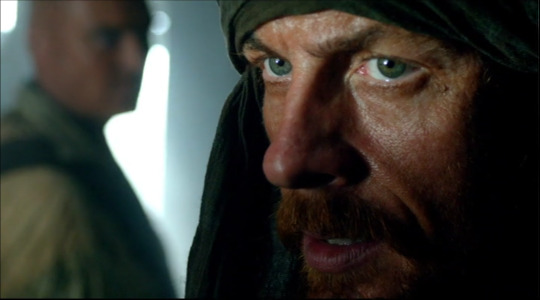
The quartermaster Hal Gates (below) walks through the merchant ship assessing the prize as the crew breaks down the door to Silver’s compartment, in which he finds the cook dead, stabbed in the back, Silver claims to be a very good cook and asks to join
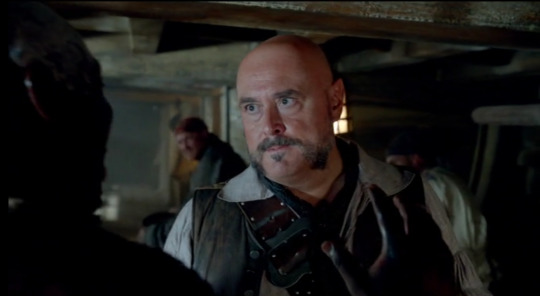
On the deck, Singleton (below, and also pictured in the background of Flint’s picture) is giving a speech to the captured merchant sailors, appealing to their sense of class consciousness
"Now that the fight is over, you have nothing more to fear from us today. Because we know this fight was not of your making, it was the choice of our true enemy, your true enemy, the tyrant captain. Many of us once sailed on ships like this one, we know what it is to be slaves to his whims, his violence, his shit wages! His insufferable stupidity! So we’ve made for ourselves a different life, where we don’t rely on wages”
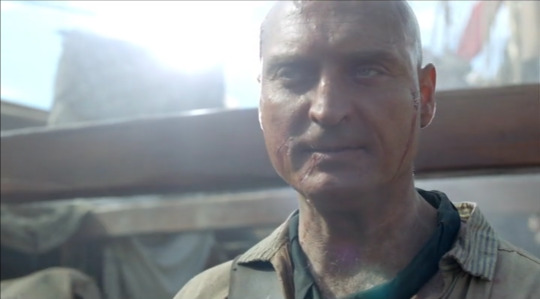
The accountant Dufresne (below, note that he is played by a different actor as his original actor sadly died after the filming of the first season) assesses the prize as barely covering their costs and, after four prizes in a row with little profit, Gates is concerned about dissent in the crew, and that Singleton is angling for the captaincy
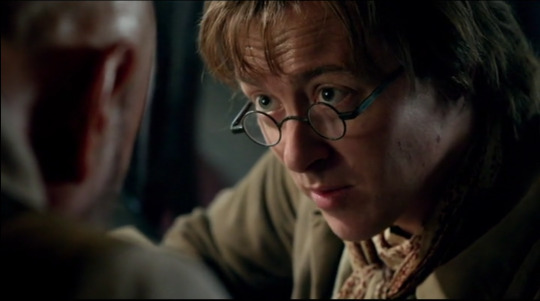
Flint and Gates appear conspiratorial over the logbook, saying it proves that this is the ship, but Gates quickly spots the missing page, the schedule, without which the logbook isn’t very useful in leading them to the greater prize
“let me see if I have this right. This is the fourth prize in a row from which the profits will barely exceed the expenses it took to win it, Singleton’s out there trying to convince your crew to torture that poor bastard of a captain simply because he hasn’t worked out how to get them to do it to you, but all’s well, because you’ve discovered, that the information we can’t tell anyone we’re looking for, exists on a page, that we don’t have“
A Royal Navy Man-o-War, the Scarborough is spotted (unusual seeing as she’s based in Boston), and the Walrus leaves behind the merchant ship so it can get away
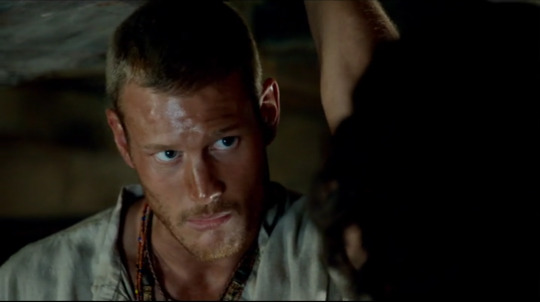
Belowdecks, the Bosun, Billy Bones (above) introduces Silver to Randall (below), who used to be the Bosun before him, before he was beaten to within an inch of his life and “lost his wits, but not their loyalty”. Randall is mistrustful of Silver, apparently because he feels like Silver is replacing him. Billy emphasises the equality of the pirate ship, that everyone should get the same food, including the captain & quartermaster
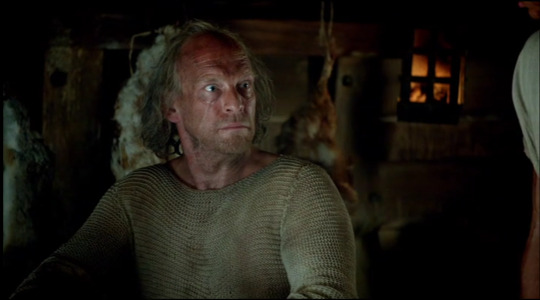
Gates tells Flint that Singleton plans to replace him, and now has the votes to do so. Flint tries to manipulate Gates into blaming himself, even though the crew’s poor morale is due to Flint’s seemingly poor choice of prizes to chases. Flint says that with a few more days, the schedule could be reconstructed from the logbook, but he’ll need a favour from Richard Guthrie who is responsible for selling all the goods the pirates steal. When Gates is skeptical that Guthrie will help them, Flint says they’ll just go back to normal and pretend none of this ever happened & Gates calls him out for lying
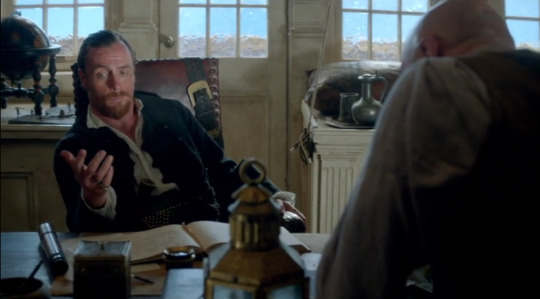
The Walrus arrives in Nassau, and the crew go ashore (below). One of the pirates tells Silver that it used to be English, now it isn’t, and that now it’s “ours”. Gates tells Billy that Flint is going to ask Guthrie for a favour and is likely to react badly when he refuses, and tells Billy to go with him and, when the time comes, restrain him, so they don’t lose Guthrie’s business. As Silver is unloading the cargo, he notices one of the logbooks is not among them and deduces the page must be from the missing volume and is in Flint’s quarters

Silver then gets hazed. He is accosted and told he needs to see Blackbeard, who “meets the new ones, no exceptions”. When thrust into a smoky room he’s told contains Blackbeard, he realises that the person in the throne is not, in fact, the pirate Edward Teach, but rather a prostitute. When he questions this, she opens her coat, revealing a large black bush. The pirates laugh, tell him to yell if he gets lost in there, and close the doors. As Silver is stripped, and has sex with the five prostitutes, he keeps glancing for the page that has fallen out of his clothes

Gates goes to speak to Eleanor Guthrie (below, left), in her tavern. She is introduced berating a captain for being scared of the mere whiff of the Navy rather than going for profit, and clapping back at a drunk pirate telling her to fuck herself. Gates warns Eleanor & her right-hand man, the former slave, Mr Scott (below, right) about Singleton’s plan to take over, and asks for a loan to buy the crew’s loyalty. Eleanor eventually agrees, but Mr Scott chides her, saying that he doesn’t think her father would approve
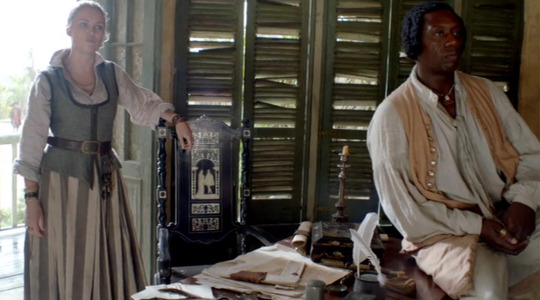
Max (below), one of the prostitutes from Silver’s hazing pours some tea as he scrambles for the page, which she already found, having noticed that despite having “a whore for every finger on your hand, but your eyes kept drifting to this”. Realising it’s valuable, but that Silver doesn’t know anyone to sell it to, she offers to act as a middle-man, in exchange for half

Gates enters a tent with several of the black pirates and negotiates with the eldest of them, who he knows the rest will follow, to buy their votes. Despite having spent the entirety of Eleanor’s loan on other sections of the crew, he persuades them to side with him in exchange for payment taken out of the next prize. Unfortunately for him, Jack Rackham (below) spots him and tells Singleton that Gates has been buying votes

Silver sneaks into Flint’s cabin aboard the ship with Max waiting in a rowing boat, where he finds the logbook and matches the page to it, but disturbs a feather Flint had left
Meanwhile, Flint has his meeting with Richard Guthrie (below), explaining his plan, how he heard of it, how the logbook confirms his lead, and that he needs Guthrie’s contacts to reconstruct the schedule
“Let me tell you a story, about a Spaniard named Vasquez. A few weeks ago, he staggers into a tavern in port royal, takes a seat next to an English merchant captain. Vasquez, it turns out, is dying, bleeding to death from a knife wound to the belly. The knife wound was courtesy of his former employer la Casa de Contratacion in Seville”
“Colonial Intelligence?”
“Navy, more specifically. One of the top agents in the Americas, responsible for the security of one particular ship, a ship with a cargo so rich, the king of Spain is very anxious to see it launched. Vasquez warned that it was too late, storm season was upon them and no escort could be mustered to guard her, but his superiors demanded that he sign off. They advised him that if he couldn’t arrange for an escort, he should plot a course unknown to anyone but our captain, and consider that route to be a state secret of the highest order. When Vasquez refused and threatened to report his concerns to the court things got ugly. The ship in question? Urca de Lima. The largest Spanish treasure galleon in the Americas. According to Vasquez, total cargo in excess of 5 million dollars”
Guthrie refuses to help, saying that the ship is heavily armed even without an escort, and that even making enquiries would jeopardise his standing with the Spanish. Flint twists his arm and goes to break his fingers, asking Billy to threaten Guthrie with his pistol, but Billy instead aims it at Flint

They hear a commotion outside, it’s the British! Captain Hume of the Scarborough to be precise. Billy, Flint, & Guthrie have all returned to their positions to maintain the pretence of respectability, but Hume isn’t buying it treating us to his pontifications on the relationship between gossip and civilisation, and attempts to take them all into custody. Flint & Billy resist, defeating the Navy men, but Guthrie is shot in the shoulder
“Tell me something, Mr Guthrie. Do you have gossip here?
“Gossip?”
“I’ve often wondered if it can survive in so remote a location. You see gossip is what holds civilisation together. It reinforces shame, and without shame, well, the world is a very dangerous place”
“I’m sorry, I don’t understand”
“Do you know what the gossip is in London about you? The gossip is that you make your profits selling ill-gotten cargo, stolen by the pirates of Providence Island”
Singleton confronts the leader of the black pirates about his change of heart. When they refuse to change back to his side, Anne Bonny (below right) appears together with Jack Rackham and she kills them
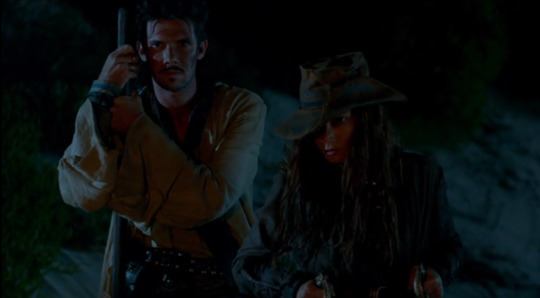
Before the leader is killed, Captain Charles Vane (below) comes out of the shadows too
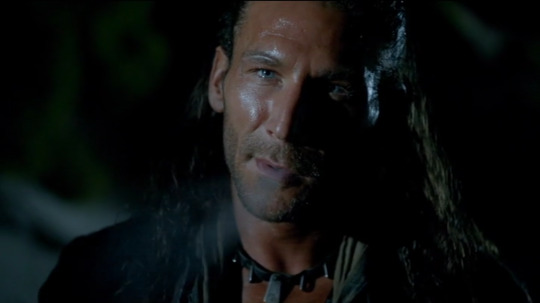
Gates tells Mr Scott & Eleanor that he’s secured the votes, only to be told by one of the remaining black pirates that their leader was killed, and his last words were “Vane”. Eleanor decides to do something about Vane
Jack, Anne, & Vane are drinking in a brothel, and discuss their plan. Singleton will become captain, fail at it, and the skilled hands will then defect to their crew. We also find out that Jack & Anne are fucking. At this point, Eleanor storms in, and punches Vane. He punches her back and then offers her a hand to help her get back up. He follows her as she goes to clean up. She explains that he’s fucked her over, and we find out he used to love her and, despite grabbing her face, he still tucks her hair behind her ears suggesting conflicted feelings about that. She threatens to cut him off from selling goods, but vane points out that her father is the one who buys the goods, and he’ll always choose profits over daughters
Max sees that Eleanor has been hit, and leads Eleanor to her bedroom, hand-in-hand. She correctly guesses that Vane is the one who hit her and, when Eleanor blames herself she scoffs at it. She nurses Eleanor, they kiss, and then have sex
Flint & Billy sail away from Mr Guthrie’s mansion, with his pale, unconscious body. Flint strips Guthrie’s rings & wig, and explains that he plans to hide Mr Guthrie, so as to avoid panicking the crew when they find out their fence is burnt
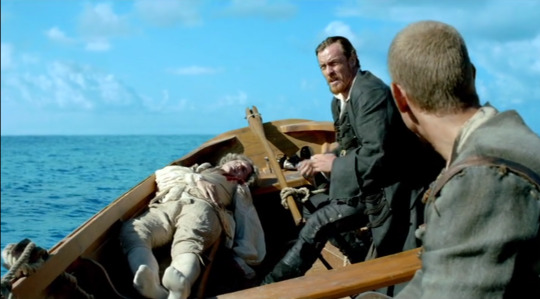
Billy calls out Flint’s constant lying, and wonders if maybe Singleton is right, and they do need a change. This causes Flint to move aggressively towards Billy, but he puts his sword between them forcing Flint to keep his distance.
“War is coming, one ship is not the war. When a king brands us pirates, he doesn’t mean to make us adversaries, he doesn’t mean to make us criminals, he means to make us monsters, for that’s the only way his god-fearing taxpaying subjects can make sense of men who keep what is theirs and fear no-one. When I say there’s a war coming, I don’t mean with the Scarborough, I don’t mean with King George, or England. Civilisation is coming, and it means to exterminate us. If we are to survive, we must unite behind our own king”
“We have no kings here”
“I am your king”
Flint tells Gates about Guthrie, and finds out that whilst they were gone, Singleton has called a council to vote on him taking the captaincy. Flint takes a moment in his cabin and, whilst flinging some furniture, notices the feather Silver had disturbed
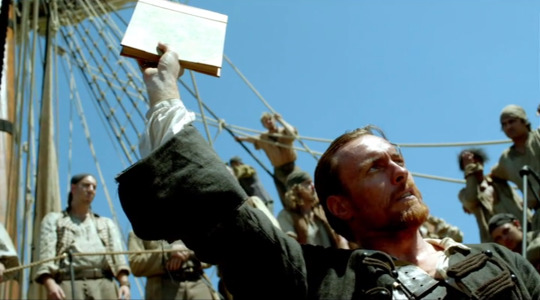
Taking the logbook to the council, Flint tells them of his plan, and accuses Singleton of having stolen the schedule from the logbook
"I’m sorry. For the short hauls. For the trouble I’ve caused. But most importantly, for the disregard it seems I’ve shown you
“The most important element of a healthy ship is trust. Trust between men. Trust between captain and crew. Without it, a ship is doomed
“For the past few months, you and I have been on the trail of a prize so rich, it could upset the very nature of our world. And for that reason, I felt it necessary to keep it secret
“I didn’t trust you. And that was my mistake. Right now I would like to tell you that prize is within our grasp and we are close, so close. But it would appear that my concerns about secrecy had merit
“Someone on this crew discovered my plans. And tore from this log the very page necessary to discover that prize. Stole it for their own gain. Stole it from us. And then, stoked your resentment to cover his crime, and make himself your captain”
Obviously, Singleton is confused, and protests that he doesn’t know anything about this. Gates points out that this is a serious accusation, thievery being punishable by death, and a false accusation likewise. Per the articles of the ship, Singleton must either submit to a trial (with Gates as judge, who Singleton does not consider would be impartial), or they can settle it by sword
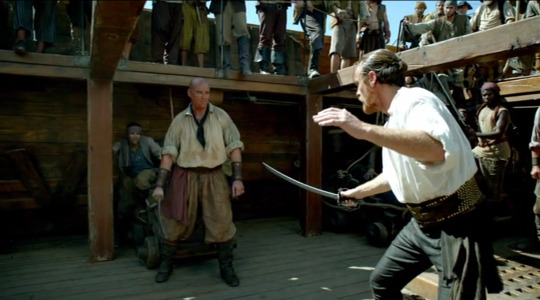
This fight is analysed in a lot of detail by Matt Easton (a historical fencing instructor, well versed in military sabre of the late 19th and late 18th centuries, so only shortly after the period of the show) here (may contain spoilers for later in the show, I don’t remember). Flint has good form, and is clearly well-trained, but Singleton is stronger, tougher, and more ferocious, easily gaining the upper hand
There is some back and forth, with Flint temporarily gaining the advantage, before losing it again, ending up injured and covered in blood. He is finally able to grab a cannonball and smash Singleton on the head, before crawling over him and beating him to death in front of a shocked crew
Flint produces a piece of paper, seemingly from Singleton’s bloody corpse, and offers it to Billy (seeing this page, Silver confirms that he does in fact still have the real page). Billy opens it, sees that it’s a completely blank page, but as Flint coolly holds his gaze tells the crew that it is in fact the stolen schedule

“Friends, brothers, the prize that you and I have been pursuing, is l’Urca de Lima, the hulk, a prize of almost unimaginable value, now with this page securely in our possession, we can begin our hunt, and we will succeed, no matter the cost, no matter the struggle, I will see that prize is yours, I’m not just going to make you rich, I’m not just going to make you strong, I’m going to make you the princes of the new world!”
The crew all cheer whilst Billy, Gates, and Silver, who all know that this page is not real look on in disbelief
Max is called from her room, where we see Eleanor sleeping naked on the bed by Idelle, one of the other prostitutes. She goes down to meet Jack & Anne and, sitting on his lap (which Anne does not like), tells them she has something she thinks they may want to buy
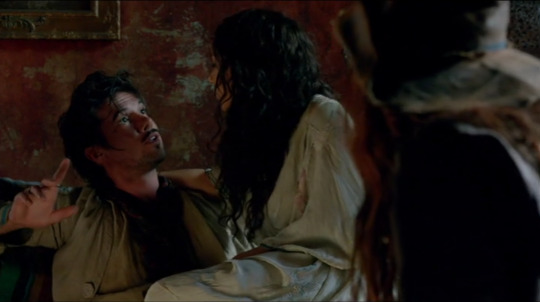
4 notes
·
View notes
Text

Steve x Tony
@shieldslinger / send me a ship and-
Who asks the other on dates: lbh with each other here, these are the kind of assholes that have an actual date night. sometimes they even make it to it and do date things. but also let's be honest with the fact they've been going on dates for years and were too dumb to realize it. museums? burgers and a movie? you know they've done it, you know it was a date, and you know they had literally no idea. because they're dumbasses.
Who is the bigger cuddler: with all the unnecessary touching that went on with them from like literally steve's first day out of the ice and you come into my home and ask that question? as touchy as they were before (those sweet, sweet shoulder squeezes of validation) you know it's worse now. movie night's probably a nightmare just because you know it's either bc tony's draped some part of himself on steve, or they're jammed so close together you couldn't squeeze a sheet of paper between them, or...listen. when two tactile people love each other very much, they're probably really gross and annoyingly handsy, and i don't mean in the...gropey kind of way, they're just touchy. all the time. must toch. plus they have a shitton of issues, which probably doesn't help in that either but eh.
Who initiates holding hands more often: there's a theme here, you know that right. there's a theme here, because it's a theme in canon, and it's tony offering a hand up to steve. like it's a thing, you know it, i know it, so if you don't think tony's needy hand holder in this relationship, you'd be wrong. it's sad, he gets this weird little thrill at even being able to do that, and on the one hand...you gotta feel bad for him. he'd take whatever steve gives him and tell himself that's enough and he's content with it, because it's steve. but knowing steve's okay with it? a religious experience.
Who remembers anniversaries: well, it's not steve rogers, i can tell you that. and you know what, that's okay, and that's fair, and tony loves him anyway. he might be the man with a plan, but he's useless with a planner. he gets caught up in things, it's fine, tony remembers for the both of them, it's why he has friday. what i'm saying is the only one who really remembers any important dates at all is friday.
Who is more possessive: i don't know that...you could really classify either of them that way? overly protective, sure. clucky with mother hen tendencies, the both of them, yeah. taking what they can of each other's time, even if it's just to be able to say good night and good morning, absolutely. but i don't think...with who they are as people, they really can't be.
Who gets more jealous: which goes back to being possessive, right, like tony has a little jealous streak but it doesn't manifest blatantly as one. two, they're public figures so...there's not a lot of room for jealousy there. like captain america and iron man might be characters they play (which are still them, i know i've talked about it but bear with me, it's an idealized version of them, separate from the inner selves) but they're public, you know, they're superheroes, and there's an expectation you share each other with the job. and with the people you save. with the world, really. i think it's more about taking what time they do have as steve and tony more than anything else.
Who is more protective: this is a joke, right? this is a joke. these two idiots would throw themselves in front of each other over and over and over again if you let them. that said, tony's moreso. and i'll tell you why. everything he's done? all the bad? the times he's sold his soul? was to keep steve - and their loved ones - safe. or happy, in a situation where there was really nothing they could do. every time. or i'll go one better. tony will absolutely trade his own life for steve's in the blink of an eye, because he's always believed between the two of them steve's the better man. he's done it. willingly. without a second thought once he's made the decision to do it. he probably has a "sacrifing myself for the greater good and especially steve" face. i'd like to lie and say that he understands if something happened to him how badly it would hurt steve but...if it came down to a choice of tony dying if it meant steve would live, he'd trade himself in a heartbeat. that's uh. something he's working on (he's not).
Who is more likely to cheat: this really is a joke. steve "my middle name is noble" rogers and tony "has been in love with steve rogers for years" stark. like tony would never, ever, ever say it, but this is it. i don't mean in some fatalistic way, and i mean he fully believes he has an expiration date so he wouldn't say anything anyway, but this is it. steve's always been The One. his Person. never would happen, not in a million fucking years.
Who initiates sexy times the most: you would think the answer is anthony edward stark and in most cases you'd be right, but steve rogers is not most cases, it is steve rogers and the rules don't apply to him. by which i mean surprisingly steve is the proactive one here, and i think it's because tony is...he is hesitant. it's weird, he's pushy with his forms of affection and then he backs off in this arena but i would argue he's getting better about it, and that the only reason he is like that is because he doesn't...he's very careful with steve, really, he's still walking on eggshells a little. give him time, the tables will turn, he'll be pouncing steve from dark corners like an overgrown house cat with the 3am zoomies and a need to fight.
Who dislikes PDA the most: they're not, you know, public yet. so it's not like this is really a thing outside of their friends circle, and even then, like. i'm willing to bet literally nothing has changed in the slightest except you might walk in on them smoochin. oh, the huge manatee. tbf, for some people it might be (clint, looking directly at you) considering who wants to see their parents doing that but you know. tough tiddy. anyway, they’re just...not really the type.
Who kills the spider: listen they know some spiders who are very good people, and it's not nice to talk about premeditated murder. there is a strict catch and release program in place and by that i mean tony will absolutely release said spiders back with their people. except nat, because she's scary.
Who asks the the other to marry them: steve's joked around about that once. once. and tony did not take it well with his past history of failed relationships. not out of a fear of committment, are you kidding me, this is tony who makes being married a personality trait. but because he thinks he's a jinx. i can tell you one thing, it won't be him that asks, if they ever get around to doing something more official than cohabitating. shaking up. whatever you want to call it. not unless it's a jokey thing that gets taken seriously (which would change his tune embarrassingly fast). he's gunshy at this point. he's been engaged a few times and it's telling that he doesn't have like three divorces under his belt. and also they're still feeling out the new them, which is fine, it's good they're doing that. but he'd say yes in a heartbeat.
Who buys the other flowers or gifts: the answer you're looking for is tony stark. it is tony stark who does this, thank you. it could be big things, like, i don't know, a mansion (hello, 890 5th avenue). training robots for the gym that...no one needs to know the price tag on that steve's going systematically tear apart. training scenarios for the danger room he's spent three days straight coding and putting together. new uniforms. or it could be little things like a book steve's been meaning to get and read or his favorite bagel or...either way. it's just who tony is, he can't help it. if he has it, he gives it. honestly i feel like at some point steve's just learned to roll with it because there's no stopping it. he's been doing it forever, since day one (hey guys, remember the cray mainframe?), but now he's signed up for no complaining so you know. that's on him.
Who would bring up possibly having kids: said like it hasn't already happened. it's steve, by the way. it's 1000% steve and he's already done it and tony's giving ten million reasons why he shouldn't when he knows he's going to say yes, and so what i'm really getting at here is they need to start thinking nursery colors for the mansion, because they're not fooling anyone. and they're gonna be amazing parents and that kid is gonna be the most spoiled, loved, protected baby ever. she hit the jackpot and doesn't even know it. this is also the only superfamily content i am here for. just a dumbass, a himbo, and a superbaby. also consider. all the cute. knitted things. i demand cute knitted things, it's not up for debate.
Who is more nervous to meet the parents: that's...not an issue, for one thing. for another, like. literally their entire friends group are...all...the same people. lbr there was literally a betting pool in place and i wonder who won. it keeps me up at night, wondering who cashed in on tony and steve no longer being quite as big of a pair of dumbasses as they have been. part of me hopes it was peter parker, i worry about you, spooder-min.
Who sleeps on the couch when the other is angry: tony uh. will stay in his lab if they have a row but i can promise you he doesn't sleep much. if at all. it's part and parcel with the tony stark experience in this case. he'll stay in his hidey hole and be sad because steve's mad at him, but won't do anything about it at first, just stay and be sad. because he's sad. and also Feeling An Emotion is hard and they don't know how to use their words.
Who tries to make up first after arguments: i'd argue 70% of the time it's probably tony. like, they're both stubborn, we know that. they both dig in their heels and think they're right, the other's wrong, and they're being stupid about it. and about some things they're just literally never going to agree but don't know how to agree to disagree. tony gets set in a rut and won't consider a deviation from what he's already decided is going to happen. steve gets mulish and refuses to listen to another point of view. they butt heads. but honestly, at this point, at the end of the day (if he can stop sulking), after everything that's happened? you know, at this point it's obvious that when they argue and stay mad, bad things tend to happen. tony doesn't even have memories of the worst of it but he knows he took it badly, let's be real here (i say, like badly's not a hilarious understatement). he may not apologize in a way that says he's wrong, but he may do it for helping escalate a fight. bc, you know, blah blah, not half as good as anything as i am doing it next to you, blah blah, azure eyes, blah blah, good morning beloved.
Who tells the other they love them more often: honestly, now that those big scary words are out there, and there's no takebacksies in having said it, they've both been pretty free with them. making up for lost time, i guess. i think they have different tones, though. tony's as free with those with steve as he's ever been with anything else. he gives them...often? and with no expectation of anything in return. because that's how he's always been with steve. and from steve like...a lot of time it seems like...as much as he says it? it's a reassurance more than anything (because we know how tony is). sometimes tony even lets himself believe it without second guessing himself.
#shieldslinger#array //: ( ooc asks )#paradigm //: ( main )#bind //: ( shieldslinger :: there's that one you circle back to - for home )#// one day i'll do one of these memes without like#// writing a ship manifesto#// but today will not be that day#// anyway i fail at successfully putting into words#// how intense tony is about steve#// but here's this ig#array //: ( queue )
4 notes
·
View notes
Text
11 Questions Tag Game
Tagged by @corishadowfang! Thank you!
Rules: Answer the 11 questions and then make 11 of your own, then tag some people.
1: Is there a real-life location you’d like to base a story off of/in?
Would I?! Well, there’s the Byzantine Empire, modern day Greece and Turkey. Just look up some pictures of Constantinople and you could see why I’d love to have that sort of setting. I already have a story idea for it. An alt-history fantasy where the empire never fell, and mythical beasts invade Europe...
As for places I’ve already based a story off of...the entire continent of Deaco is full of nations based on real life places. The central region, the human Kingdom of Geralthin, is based off of medieval England (with better weather though!) which can be seen with such names like Henry, Elizabeth, Albert and Edward, along with the English feudal system of Earls, Dukes and Barons, along with “Shire” and “Bury” being included in some town and province names.
The Koutu Kingdom is lightly based on a blend of Gaelic cultures such as the Scottish and Irish, along with some Hellenic additions. Though their homeland is more plains than the Emerald Isle or the rough Highlands, their names reflect this. Domnall, Cuan, Conchobar...there’s also their pasttimes of the great Arena Marathon and other competitions of physical sport that draw on the Greek culture.
The Dacuni Tribes are heavily inspired by the Vikings. Their constant invasions to the south against every one of their neighbors, along with their constant use of battleaxe infantry should make that obvious. The wolfmen also share the similar “-nar”, “-vin”, “nir” at the end of a lot of their names. The tundra environment is similar as well, but I also just wanted an excuse for beautiful winter scenery and an aurora that lights up the sky.
The Pona Federation is a tribal republic that takes light inspiration from the Native Americans of North America. Light. I mostly just got the idea of their government from The Iroquois. The Pona are bipedal turtlefolk that live in a swampy marshland and mostly keep to themselves. I wanted some sort of republic among all the kingdoms of the world, so here they are! They develop into a modern, Constitutional Republic later down the timeline as well, one of the few places in the world that’s a bastion of freedom and liberty in a world full of autocrats and tyrants.
The Abinsil Kingdom is a subcontinent off the coast of Geralthin to the south that’s inspired by medieval Arabic kingdoms. The lizardfolk there are pious (for good reason), isolationist, and mystical. They have sects of holy warriors that guard the groves of saints, strange magic that bends reality around them, wardrakes instead of horses, and a minority of insectoids!
Finally there’s two places I haven’t really touched on, but are part of the world. The Qin Empire, a place based off medieval China (complete with eastern dragons that regularly patrol the skies), and the Republic of Salisca, based VERY heavily off of the United States (where humans have suffered at the hands of dragon-tyrants for millennia before gaining their independence).
2: What are some themes you haven’t used that you think would be fun to touch on?
I’ve touched on The Power of Friendship™ in Blackheart, but its strongest theme was that of determination and perseverance. Never give up! Fight the darkness! As long as you have a reason to believe, something to love, the corruption can never fully claim you!
Another theme I’d like to touch on is the blood of the covenant! The idea that bonds of friendship forged strong enough can be greater than even family! Themes of faith would be interesting too, a long and difficult journey where the hero questions their faith could have some really interesting and powerful results and messages.
3: What character have you created that’s the most like you? The least?
Gotta say Charles. While I’m not a winged, fire-breathing half-dragon wizard, our personalities are very similar. He’s shy, anxious, a bit of a nerd, but a good person and brave when he needs to be...really once you get past that whole dragon part we’re pretty much the same!
As for the least? Well...probably Razorwing. I mean, after what I just told you about Charles, Razorwing is a famous hero who’s always in the spotlight. He’s graceful, and skilled, and charismatic, and loved the world over...so you could see why I think he’s a far cry from me! He’s still a good person though, most characters in Blackheart are.
4: Are there any songs that really encompass what your WIP’s about?
Cold Rain and Snow
“What are we marching for?
What is this trial with our lives?
How will we win this war?
Who among will survive?”
5: Have you ever created unique races/monsters for a story? What are they?
There’s the stock dragons and kobolds, but aside from that I’ve strayed from typical fantasy, for the most part. No elves or dwarves for example. There’s the Koutu, a species of avian adventurers who revel in the unknown and make great company wherever they go.
There’s the wolfmen (Dacuni), though I’m sure there’s similar races in other media. They’re rough, gruff and prone to flying off the handle at the slightest provocation, but they’re ferociously loyal as well.
The Pona, the turtle-men of the East, were made from scratch. I wanted a calm, wise and otherworldly species that had the potential for interesting settings and circumstances (a tribal council sitting around a fire, surrounded by massive trees that go up hundreds of feet and block out the sky, anyone?)
The Ssalik of the Abinsil Kingdom are lizardmen, though not really based on any of other media. They’re friendly with humans and have their own things going on (the mystic magic, the drakes and dragons roaming their deserts...)
The half-dragons take that “dragonblood” thing and take it to the next level, the people taking on the forms of dragons because of it. They’re the size of humans and stand upright, but otherwise look just like dragons. Due to the transformation of body and mind, they have quick wits and an affinity for magic. As such, they make great sorcerers and paladins, and tend to be more accepted in academies and churches as a result.
Pseudodragons didn’t originally exist in the world. They were created, in universe, artificially by a powerful sorcerer. They’re tiny dragons the size of people that have natural urges to do good and help humanity. They love fruits and typically settle in human villages to help the villagers in their day-to-day jobs and activities. They’re near-universally selfless and kind.
The Qin...well, imagine the half-dragons, but use eastern dragons instead of european dragons as the base. They have long, flowing bodies, fins, whiskers, and no wings.
6: What’s your favorite book?
Probably The Outsiders. I can’t say I relate to the characters...but I feel for them, you know?
7: Traditional heroes or anti-heroes?
Traditional! I love classical heroes who always try to do the right thing! I think the edgy dark hero has gotten overused to the point that classical heroes are making a comeback in popularity, and I’m glad to see it. In Blackheart, most are traditional heroes. Paul or “Crux” is the closest to an anti-hero considering his background, but in the city of demons, there’s not much chance for anyone to be anything but heroic.
8: What is your favorite character from any piece of media?
Solid Snake from the Metal Gear series. A legendary hero of uncomparable skill that has somehow pulled through some of the most hopeless of situations, went rogue in an effort to save the world from Metal Gears, and has suffered and struggled against way more than he deserved to.
9: What is an AU of your WIP you think would be fun to explore?
Modern fantasy. There’s just something about fantasy races having guns and using cellphones...
10: Where do you get your inspiration from?
Demon’s Souls. The colorless fog and ruined Boletaria being so close to the black fog and ruined Palethorn are pretty obvious giveaways. Also D&D, as all the dragons, priests, holy magic and kobolds might make clear.
11: What is something you love about your WIP?
The ending. It, uh...kinda ruined me while I was writing it. I’m absolutely in love with the characters, too.
Now for my questions! (Mostly just an excuse to hear some worldbuilding!)
1: What’s your favorite genre and why?
2: Unusual themes or plot points that are important in your story? (Music or cooking, for example)
3: Which two characters are the most polar opposites? What is their relationship in the story?
4: Prophecy vs. Defying fate? Which do you think makes for a better story?
5: Which character are you most proud of, for any reason?
6: If your story could be told in any other sort of media, what would it be? How would you like it made?
7: Which part of your world is the most interesting, in your opinion? Location, lore, whatever really drew you into making it.
8: How much do your experiences color the world or characters of your story? Is it born of a worldview you either have or something you wish reality was closer to?
9: What government system does the setting follow? If it’s an international journey, how are the nations different from each other?
10: What role does culture play in the world? Where did you get the idea for such traditions and pasttimes?
11: How do you like your villains and heroes? How do they think and act most of the time?
Tagging @oceanwriter, @paper-shield-and-wooden-sword, @elliewritesfantasy, @caffienefuelsmywriting and @lady-redshield-writes!
7 notes
·
View notes
Link
You will not be surprised to be told that Tucker Carlson’s new book, Ship of Fools: How a Selfish Ruling Class Is Bringing America to the Brink of Revolution, contains a series of attacks on diversity, immigration, feminism, and “identity politics.” You may, however, be surprised to be told that the book contains high praise for Ralph Nader, quotes from Studs Terkel, laments the disappearance of the anti-capitalist left, and presents Jeff Bezos as one of its central villains. Carlson has written a book that is as staunchly nationalist as one would expect. Yet it’s also a little bit socialist.
Carlson’s basic framework would commonly be described as “populism.” There are the people, and then there are the “ruling class” elites. The rich and powerful care only about themselves. They do not care about Middle America, and have presided over the opioid epidemic, the hollowing out of industrial towns, and exploding inequality. Meanwhile, ordinary workers suffer. At times, he almost sounds like Bernie Sanders. His analysis is persuasive, well-written, and often funny. It’s also terrifying, because elsewhere in the book, Carlson makes it clear: he wants a white-majority country, thinks immigrants are parasitic and destructive, misses traditional gender hierarchies, and dismisses the significance of climate change. Carlson’s political worldview is destructive and inhumane. Yet because it has a kernel of accuracy, it will easily tempt readers toward accepting an alarmingly xenophobic, white nationalist worldview. Carlson’s book shows us how a next generation fascist politics could co-opt left economic critiques in the service of a fundamentally anti-left agenda. It also shows us what we need to be able to effectively respond to.
First, let’s look at the parts that are most right, and perhaps most unexpected. In an analysis almost identical to that of leftists like Thomas Frank, Carlson says that Republicans and Democrats are now both beholden to corporate power. Sometime in the 1990s, Carlson says, he began wondering “why liberals weren’t complaining about big business anymore,” and had started celebrating “corporate chieftains” like Steve Jobs, Bill Gates, and the Google guys. Ralph Nader should be a hero to all liberals, spending his days “greeting a parade of awestruck liberal pilgrims” from a retirement home. Instead, he is “reviled,” even though “every point Nader made was fair” and “some were indisputably true.” Suddenly “both sides were aligned on the virtues of unrestrained market capitalism… left and right were taking virtually indistinguishable positions on many economic issues, especially on wages.”
The “prolabor” Democrats, Carlson says, were “empathetic and humane” and “suspicious of power.” But today they have disappeared, and the party of the New Deal is now a party of Wall Street. Carlson points out that Hillary Clinton won wealthy enclaves like Aspen, Marin County, and Connecticut’s Fairfield County (the hedge fund capital of the country). “Employees of Google, Facebook, Apple, Microsoft, and Amazon donated to Hillary over Trump by a margin of 60-to-1,” and while “Seven financial firms donated 47.6 million to Hillary,” they gave Trump “a total of $19,000, about the price of a used pickup.”
As a result, Carlson says, Democrats are now largely silent on labor issues: “When was the last time you heard a politician decry Apple’s treatment of workers, let alone introduce legislation intended to address it?” Corporations make vaguely “socially liberal” noises, like decrying gun violence and being pro-LGBT, and as a result escape criticism for mistreating their workers or contributing to economic inequality. Carlson cites Uber, which has prominent liberal Arianna Huffington on its board and has had to commit to reforming its “bro culture.” And yet it still treats its drivers like crap:
“[Uber is] running an enormously profitable business on the backs of exploited workers… An obedient business press [has] focused on the ‘flexibility’ Uber’s contractors supposedly enjoyed. … [But] Feudal lords took more responsibility for their serfs than Uber does for its drivers… Uber executives weren’t ashamed… They sold exploitation as opportunity, and virtually nobody called them on it.”
What happens, Carlson says, is that corporations “embrace a progressive agenda that from an accounting perspective costs them nothing.” They are, in effect, purchasing “indulgences from the church of cultural liberalism.” Sheryl Sandberg published Lean In and Mark Zuckerberg is floated as a possible Democratic presidential candidate, but Facebook is an evil corporation to its core. Sean Parker has admitted that Facebook was engineered to be addictive, that its designers thought: “How do we consume as much of your time and conscious attention as possible?… We need to sort of give you a little dopamine hit every once it a while.. To get you to contribute more content.” Carlson notes that the company commits “relentless invasions of the public’s privacy,” and that epidemiologists have linked the product “with declining psychological and even physical health.” Carlson writes:
“Evidence has mounted that Facebook is an addictive product that harms users, and that Zuckerberg knew that from the beginning but kept selling it to unknowing customers. Those facts would be enough to tarnish most reputations, if not spark congressional hearings. Yet Zuckerberg remains a celebrated national icon.”
We know Facebook is manipulating people’s emotions to sell advertising, and yet we still get headlines like “How To Raise The Next Mark Zuckerberg.” Or look at Amazon. Jeff Bezos supported Hillary Clinton for president, yet “no textile mill ever dehumanized its workers more thoroughly than an Amazon warehouse.” Carlson asks: “when was the last time you heard a liberal criticize working conditions at Amazon?… “Liberals and Jeff Bezos [are now] playing for the same team.” Successful businessmen “pose as political activists,” and pitch their products as woke. That way: “affluent consumers get to imagine they’re fighting the power by purchasing the products, even as they make a tiny group of people richer and more powerful. There’s never been a more brilliant marketing strategy.” He goes on:
“The marriage of market capitalism to progressive social values may be the most destructive combination in American economic history. Someone needs to protect workers from the terrifying power of market forces, which tend to accelerate change to intolerable levels and crush the weak. For generations, labor unions filled that role. That’s over. Left and right now agree that a corporation’s only real responsibility is to its shareholders. Corporations can openly mistreat their employees (or “contractors”), but for the price of installing transgender bathrooms they buy a pass. Shareholders win, workers lose. Bowing to the diversity agenda is a lot cheaper than raising wages.”
Carlson mocks the “socially liberal” Davos elite who hand-wring about inequality while reaping its fruits. He points to the example of Chelsea Clinton, who talked nobly about her values (“I was curious if I could care about [money] on some fundamental level, and I couldn’t… That wasn’t the metric of success that I wanted in my life”) before buying a $10 million, 5,000 square foot apartment in the Flatiron District that spanned an entire city block. Chelsea Clinton’s career, for Carlson, shows how contemporary believers in “meritocracy” benefit from an unjust and nepotistic system: Clinton was paid $600,000 a year as a “reporter” for NBC despite appearing on the network for a sum total of 58 minutes. The bubble of privilege that many elites inhabit was exemplified in Hillary Clinton’s 2016 campaign, which suggested that “Things in America are Fine.” (The slogan was actually “America Is Already Great.”) Carlson is not wrong here: Hillary Clinton herself was so out of touch that she is still saying things like “I won the places that represent two-thirds of America’s gross domestic product… So I won the places that are optimistic, diverse, dynamic, moving forward.”
Carlson also says that there has been a troubling tendency for both sides to embrace the military-industrial complex. Key Democratic figures supported the Iraq War (e.g. Feinstein, Kerry, Clinton, Biden, Edwards, Reid, Schumer). It was New York Timesreporters who contributed to scaremongering about Saddam in the leadup to the war, the New York Times op-ed page where you can find contributions like “Bomb Syria, Even If It’s Illegal” or “Bomb North Korea, Before It’s Too Late,” and New York Times columnist Thomas Friedman who said that Iraq War had been “unquestionably worth doing” because it told Middle Easterners to “suck on this.” Barack Obama (who was given the Nobel Peace Prize, Carlson says, for “not being George W. Bush”) killed thousands of people with drones, including American citizens, prosecuted whistleblowers, kept Guantanamo open, and failed to rein in the vast global surveillance apparatus. Hillary Clinton pushed aggressively for military action in Libya, which destabilized the country. There is a D.C. consensus, Carlson says, and it is pro-war. Some of the book’s most amusing passages come when Carlson flays neoconservative hacks like Max Boot and Bill Kristol, who have now become allies of the Democratic Party in paranoia about Russia. Boot’s career, he says, publishing articles like “The Case for American Empire” and advocating invasion after invasion, shows us how “the talentless prosper, rising inexorably toward positions of greater power, breaking things along the way.” The hawkish consensus is no joke, though, and Carlson says he misses the liberal peaceniks, who “were right” when they warned that “war is not the answer, it’s a means to an end, and a very costly one.”
To many on the left, everything Carlson says here will be familiar. The phenomenon he’s pointing to, by which Democrats and Republicans both became free market capitalists, has a name: neoliberalism. Larry Summers was quite open about it when he said that “we are now all Friedmanites.” Carlson’s point about how corporations whitewash exploitative practices by appearing socially progressive is one leftists make frequently (see, for example, Yasmin Nair’s essay “Bourgeois Feminist Bullshit” and Nair and Eli Massey’s “Inclusion In The Atrocious“). The foreign policy stuff is a little off: it’s not that Democrats used to be pacifists, since the Vietnam tragedy was initiated by JFK and expanded by Lyndon Johnson. Empire has always been a bipartisan project, antiwar voices in the minority. Aside from the suggestion that this is new, it’s accurate to say that American elites have largely embraced the projection of American military power.
But Carlson is not going to be joining the Sanders 2020 campaign. His book has a dark side: a deep suspicion of cultural progressivism, inclusion, and diversity. Carlson believes that liberal immigration policies have been imposed because they serve elite interests (Democrats get votes and Republicans get cheap labor for Big Business). As a result, the fabric of the country is fraying. He writes:
Thanks to mass immigration, America has experienced greater demographic change in the last few decades than any other country in history has undergone during peacetime… If you grew up in America, suddenly nothing looks the same. Your neighbors are different. So is the landscape and the customs and very often the languages you hear on the street. You may not recognize your own hometown. Human beings aren’t wired for that. They can’t digest change at this pace… [W]e are told these changes are entirely good… Those who oppose it are bigots. We must celebrate the fact that a nation that was overwhelmingly European, Christian, and English-speaking fifty years ago has become a place with no ethnic majority, immense religious pluralism, and no universally shared culture or language.
To some people, what Carlson writes here may not seem racist. And like many conservatives, he resents having what he sees as common sense treated as bigotry. I don’t think there’s any way around it, though: Carlson’s problem is that the United States looks different, that it’s not “European” any more and has no “ethnic majority.” He’s explicitly talking the language of ethnicity: it’s destabilizing that we’re not a white-majority country anymore. This isn’t simply about, say, the “Judeo-Christian ethic” or embracing the “American idea.” If that were the case, then it would be hard to make a case for why we shouldn’t let in the Catholic members of the migrant caravan, who love American culture and want to march across the border saying the Pledge of Allegiance. The problem is that they are not European, that they change the look of the place, that they disrupt the “ethnic majority.” Europeans are the real Americans, the ones that hold the fabric of the nation together, and minorities, people who are different, threaten to undo that fabric.
(Continue Reading)
43 notes
·
View notes
Note
Ed for character ask, if you want! Have a nice day ❤️
If I want? If I want??? If I want?!?!?! OF COURSE I WANT TO. Ed ruined my life in the best possible way and I will ramble about him forever. LET’S. DO. THIS.
How I feel about this character:
Obviously, you guys know that Edward Elric is not only my favorite character in the fma universe, but probably my favorite character in general. He’s excellently written, deeply representative of the nature of humanity, and endures beautifully subtle development over the course of his story. I’ve done several character analyses of Ed, but I tend to ramble. Here, I really want to take my time, and talk about specific aspects of his character I think are the most worthy of note. This might get l o n g, so grab some snacks and settle in. Let’s talk about the Fullmetal Alchemist!

One of most defining and well-written characteristics of Ed is his tragic backstory. The consequences of attempting to revive their mother follow Ed and Al years after it occurs, and forms one the main backbone of their story. While the immediate aftermath tends to define a large part of Ed’s personality in the beginning, what makes him so fascinating is that he eventually learns that using his personal tragedies as an excuse for his shortcomings with get him nowhere. Instead, he learns to use his suffering as a springboard to make sure no one else ever has to feel the way he and his brother did. The awful things that happen to Nina are a major setback, but instead of collapsing further in on himself, Ed, mostly thanks to Al, realizes that not only is it ok to start by trying to save himself, but with that effort, he can become stronger, and by extension, do more to help others. So, instead of using tragedy as an excuse for his weaknesses, Ed faces them to make himself stronger, and throughout his journey, use them as markers of his progress, or as checks to his humility.
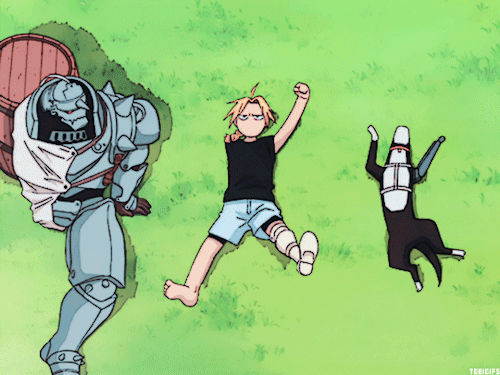
Ed is also incredibly well-written to reflect his age. Sure, your average twelve-year-old is not an alchemic prodigy serving in the military, but I’m talking about how Ed reacts to his circumstances as a boy who’s just trying to piece he and his brother’s lives back together. Ed can play up the adult facade as much as he wants, but Arakawa also wrote him to be what he is; a kid. In the early stages of his story, Ed reacts to many inconveniences with fits of frustration, triumphs with unabashed cockiness, and authority or criticism with an upturned nose. Most of these immature reactions lessen or die out as his story progresses, as it does when someone starts to grow up. I can say that after living with a younger brother at ages 12, 13, 14, etc., Arakawa did a spectacular job of not only capturing those years with deadly accuracy, but applying them to an extraordinary individual like Ed in a way that felt effortless. While on a quest that eventually would determine the fate of the world as they knew it, he also gets nervous over a crush, and deals with the ups and downs of teenage friendships. (I mean, 99.9% of people’s best friends in high school don’t give up control of their body to an immortal being but there’s a metaphor I’m getting at here.)
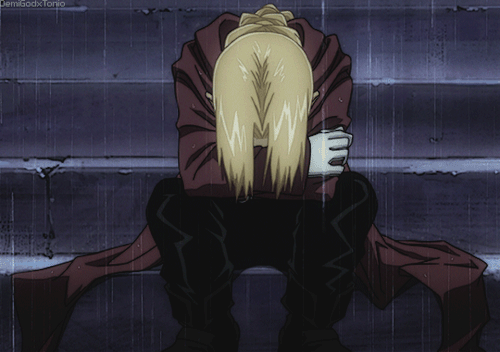
Another super interesting aspect of Ed’s character is his guilt complex. For someone who so acts his age, he still takes on blame for many things that legitimately weren’t his fault. He blames himself for the loss of Al’s body, though there was no way he could’ve know what Truth would’ve taken from him, or that Truth would’ve intervened at all. He chastises himself for not being useful in dire situations when Winry stepped up to deliver Dominic’s grandchild in Rush Valley. It wasn’t his area of expertise, while Winry, he acknowledges, grew up with doctors for parents and reading medical textbooks. He feels helpless, but how could he know he would find himself in such a situation? He even holds himself responsible as a culprit in Hughes’ death for getting him involved in their research of philosophers’ stones. What Hughes discovered about the nationwide transmutation circle was, ultimately, his own doing. In addition, besides blaming himself for the loss of Al’s body, a guilt that Ed carries to the end of his story was his inability to save Nina. Just because he was the first person to put all the pieces together, he thought that if he realized Shou Tucker’s true intentions that much sooner, she would still be alive. Yet, realistically, no one else had figured it out either. He was just in the wrong place at the right(?) time. Yet, all of this being said, the moments during which Ed overcomes some of his guilt are some of the most powerful in the entire story. (Learning that Al didn’t blame him for the loss of his body is a prime example.)

As I’ve mentioned in other recent character analyses, a complex personality is key to a strong and likable character, and my god, does Ed have one. Ed has many traits that make him just fascinating to watch. While his early cynicism of humanity fades away, he remains cocky, stubborn, abrasive, short-tempered, sarcastic, occasionally hostile to figures of authority, and not one above stroking his own ego. Yet, a lot of those aspects of his personality veer towards superficial. He views every human life (in all forms) as sacred, and something he is painfully reluctantly to use to further his own goals. To those who earn his respect, he is endlessly loyal, selfless, and fights for those who can’t fight for themselves. His personality also takes on a different tint (like a real person) when he interacts with different people. He fights to see the Ling within Greed, but ultimately respects Greed as a member of his team. He’s in awe, yet honest with Riza. He’s sarcastic with Roy, but when in danger, is his greatest ally. He’s level-headed, firm, and forgiving with Al. He’s uniquely gentle and compassionate to Winry. In short, he’s beautifully and painfully human.
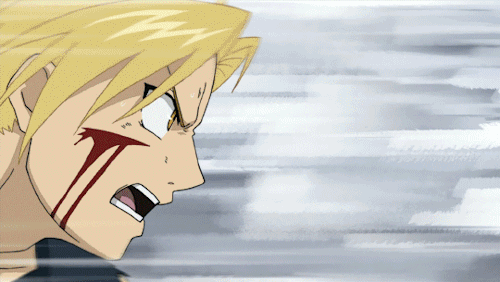
Finally, Ed is an excellent foil to the character of Father. While the latter tried to make himself a perfect being by ridding himself of humanity’s seven deadly sins (an idea I remember someone, though I can’t remember who, likening his goal to the idea of Nietzsche’s “Übermensch,” which is basically a form of superior man who could rise above traditional Christian values to impose his own. That sounds pretty accurate to me, but I’m no expert in this corner of philosophy.), Ed actively embraced all of his flaws, guilt, and well, sins, to ultimately become a more compassionate individual who is able to ultimately triumph over evil. (As a side note, Greed’s aid in this final battle really adds extra emphasis to his earlier explanation to Ed that “everyone wants something they cannot have.” The fact that Greed sacrifices himself in this moment to assure Father’s defeat proves that point several times over, which just makes those final sequences of the battle that much cooler [and heartbreaking]). The fact that Ed, who is riddled with what Father considers the ultimate faults of humanity, still overcomes him, proves that the rejection of own’s own humanity is a greater evil than the sum of it’s parts. As a huge characterization nerd, that’s pretty freaking cool.
All the people I ship romantically with this character:
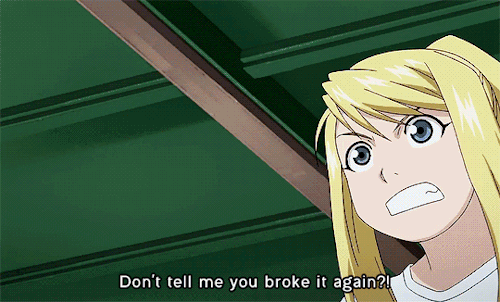
Edwin is easily one of my top five OTPs, and I honestly don’t see shipping Ed with anyone else. Like Roy and Riza, Ed and Winry’s relationship is built on years of trust, respect, friendship, and tragedy. While they sometimes struggle with communicating their feelings, whether its about each other or the circumstances they’re facing, they always manage to get their feelings across when the moment demands it. It seems that their respective obsessions confuse or annoy each other, yet, they each possess huge admiration for the other’s accomplishments and passions. They understand the harsh burden of losing their parents, and Winry never judges Ed for attempting to revive his mother, likely because she had the same kind of longing. In addition, each of them are deeply concerned for the safety of the other, with Ed especially going to great lengths to ensure Winry is unaffected with his involvement in the military. Sadness of one pains the other, and they’re both hellbent on making sure the other is, in the end, happy. Talk about the makings of a great relationship! Also, at the most basic level, they’re SO DAMN ADORABLE.
My non-romantic OTP for this character:
I have to go with Al here. (Also apparently this got too long to add more gifs so rip to that idea…) These two have been through so much together, balance the weight of their varying personalities, and as a result, are the ultimate allies. Besides the deep care these brothers share, the most interesting aspect about them is how their personalities contrast and support one another. Ed is typically hot-headed and impulsive. Al is calmer and leans more towards logic. Ed has a big ego and is sarcastic. While Al has his moments, he’s unflinchingly kindhearted. However, their mutual passion for alchemy, humanity, and completing their quest are unmatched. The story is about brotherhood, and these two are the ultimate protagonists. Al’s superior battle sense, levelheadedness, and gentle personality are the perfect balance to Ed. He brings him back down to earth, yet encourages him to race to the ends of it. They joke and argue, but you know they would sacrifice everything for the other.
My unpopular opinion about this character:
*sigh* The Ed being really short joke did eventually get old…
One thing I wish would happen / had happened with this character in canon:
As is the case with many fma characters in my book, I want to see more! Knowing Ed, there’s no way this kid would peak at 18. I want to see his adventures after the promised day. I want to see him with Winry and his kids, being a great father, but I also want to see him traveling, discovering, and maybe getting himself into a bit of trouble here and there! At the end of years of struggling and hardship, I want to see the next crazy step in his journey. There’s no way he’d sit still for long. The sky’s barely the limit for Ed, and i want to see how far he flies.
Send me a character, if you dare.
#edward elric#fma#fma brotherhood#character analysis#nikki speaks#good lord was this fun!!#lmao i wrote an essay;;;;;;
136 notes
·
View notes
Text
The 21 Best Nintendo GameCube Games of All Time
hi Weaver dazzling individuals it's Alex
from Nintendo life here and today we're
going to view the 21 best
GameCube games why 21 well since it's
sort of a subject now such countless things a
tad seriously fascinating we're going to
stick to one game for every primary series
establishment for instance you can have Paper
Mario and Super Mario Sunshine however you
couldn't say how the Super Mario
Daylight and Super Mario 64 not just
since it's not on the Gamecube as
regular the games are in no specific
request aside from the last five which are
viewed as a best 5 so the initial 16
are in no structure despite the fact that individuals will
still remark saying they think
something ought to be higher however I'm certain
you're not put at any rate that is more than
enough wavering we should make a plunge directly into
things out of the dimness they came
with a contemptuous will to obliterate humankind
made principally by eggs uncommon representatives
timesplitters was a series that was a
bit diverse to other first-individual
shooters and time splitters to does
all that the first did and
redesigns it ten times the storyline is
totally crazy fundamentally you need to
return on schedule to different unique
time-frames on earth to stop the time
splitters from utilizing the time gems
to annihilate earth or something I mean
it's really dubious realize that
someone in the remarks will address me
the single-player is incredible however the genuine
rush of this comes from the
multiplayer get three companions and
you'll shoot monkeys as
gingerbreadmen quickly by any means
the pleasure is all mine Andre yes Mario Kart
Twofold Dash the GameCubes answer to well
Mario Kart the trick this time is that
there are two characters riding around
on every individual Kart and really
switches things around in a fairly
intriguing way especially when you
get into co-administrators in spite of the fact that I don't
think they call that it's been some time
fundamentally you have two genuine individuals
one controls the individual driving and one
controls the person not driving
rather tossing shells and things it's
surely not even close as refined as the
later sections yet in any case twofold
that is a mind blowing measure of fun and
for the time it truly was an enormous
overhaul on 64
click then, at that point hop up past great and insidiousness
is it's a peculiar one
believe it or not is one of those games it's
simpler to show than it is to really
depict it's kind of an
activity experience Photography game once more
actually it isn't so natural to portray it
has an amazing religion following and with
the declaration of Beyond Good and Evil
2 going to certain stages we proved unable
be more excited to remember this for our
list
blunder puh give me a collar and I need
another can of frozen yogurt with smaller than expected
pies OK for any individual who hasn't played
this game this might appear to be a strange
decision to remember for our best 21 rundown yet
hold on for me the simpsons quick in and out is
fundamentally the best Simpsons game that is
at any point been delivered aside from possibly the
arcade game which is most likely on par in
a nutshell it's a semi family-accommodating
Excellent Theft Auto with the cast of The
Simpsons and heap references to the
fundamental series they may not all be
references to great scenes however
by the by it's ideal to have them
there yes it's troublesome yet you can't
reject that Super Mario Sunshine is still
an incredible game whether or not you
believe it's an incredible Mario game or not
actually when this came out I
totally cherished it and in some little
way I think I favor it - Super Mario 64
that was a joke yet at the same time it's an extraordinary
game and it had a go at something new with the
Mario type and it didn't completely work
actually however by the by it's acceptable fun
also, it unquestionably has the right to be on this
list
so any individual who's an enthusiast of the series I'm
sure I don't have to say the paper mario
the thousand-year entryway is the
quintessential Paper Mario experience
there's an entire host of truly
fascinating characters with really
very much created characters if possible
accept something like this it shouldn't come
as an unexpected that this was created by
clever frameworks similar individuals who
brought us such games as Flair seal
for me by and by this is the best mario
RPG out there totally pulverizing the
contest
definitely alright it's in fact a n64 game
assuming you need to get truly specialized however
all things considered Animal Crossing is an
inconceivable game regardless of whether it has been
totally supplanted by the spin-offs at
the hour of its delivered there was
in no way like it and despite the fact that it hasn't
matured appallingly well it is as yet a dreadful
part of fun there's no genuine need to go
back and play in the event that you have new leaf
since really new leaf is boundlessly
better yet all things being equal for the GameCube this
is effectively one of the champion titles
today reports in from top ones high
high express that torrential slide conditions
in the limit
recall when EA really made a few
half-nice games insane occasions SSX 3 is
essentially all that you might ever
request
with regards to a snowboarding match-up
overflowing with content boundlessly
replayable this is essentially a
snowboarding match-up that you have to claim
at no other time seen circuits where the
territory verges on veggie lover scene
presently it was an interesting decision between Super
Monkey Ball and Super Monkey Ball as well
yet, in the end the continuation just needed to
marginally take it the first oversaw
to stay away from the bizarre and abnormal monkey
moving however the mystery simply has marginally
greater inventiveness with regards to the
principle stages it additionally has more and on the
entire better little games in spite of the fact that monkey
target2 can pass on in a fire the more
late games in the series are somewhat of a
bit poo yet this one will be one that you
certainly need to play
after such countless years Luigi at last got
his first performance game on the Nintendo
GameCube and nowhen not including Mario
is feeling the loss of it's immensely amis pixie yet
without really being truly
startling so still appropriate for
more youthful players and furthermore inconceivable
fun the controls are somewhat messed up
by present day norms however on the off chance that you can get
past that this is a sensational game to
get your hands before time previously
mankind
I'm dr. Edward Roy vez I am a clinical
clinician
I'm likewise ded frightfulness games have come
along a colossal way since the first
things like the Atari 2600 what not
kind of thing where nothing was really
terrifying yet I think the advanced loathsomeness
games owe more to unceasing murkiness
mental stability's composition than to any of the
ghastliness game out there despite the fact that might well
not have been quick to do as such it was
the first to promote the possibility of
going meta I would prefer not to give excessively
away yet in the event that you put this circle into your
console your Gamecube might resemble it's
beginning to have a few issues everything's
entirely protected obviously yet well once more
again I can't actually say anything just
simply play and appreciate it
okay that is bad search for Tony
is it yet Tony Hawk's Pro Skater structure
may look somewhat unusual and it appears
like an odd decision for this rundown however
all things considered this is a game that even today
dress well stands up there's something
unimaginably soothing about riding
around on a skateboard doing inconceivable
stunts and just essentially making a numb-skull
of yourself however much as could reasonably be expected the
entire thing that is attempting to get off is
being cool and skater might well have matured
just as a wet tissue yet all things considered this
is a brilliant game most likely the best
skating match-up ever
recollect when Nintendo consoles got genuine
outsider help fun occasions Metal
Stuff Solid the Twin Snakes is the
retelling of the first Metal Gear
Strong not the first Metal Gear and by
crums is it acceptable it's very Hideo Kojima
as in it's more similar to an
intelligent film than it is a genuine
game yet all things considered I think this most likely
has the absolute most substance when it
comes to real interactivity for the series
it takes care of a ton of the issues of the
unique delivery and is generally speaking simply a
fabulous game get it
Gracious roughage was extreme picking between shade
also, color - yet in the end shade -
pretty much took it
aside from graphically this game has not
matured a day and as I would see it the
unique GameCube controls are better
than the wii controls um I'm simply going to
let's assume it doesn't exactly have the pressure
of the first given that you're truly
not that limited as far as time but rather
the expansion of looy and furthermore the
expansion of multiplayer makes this an
mind boggling experience however on the off chance that you can't
get this one since it's unbelievably
costly the first is practically similarly as
great
at the point when I had my unique GameCube I ached
for Soul Calibur - I didn't even truly
know what the ongoing interaction resembled at the
time I just realized the connection was in it and
it was a battling game and I thought
that was the coolest thing ever and you
know what it actually is
I've never fully had the option to get great
at the game yet all things considered I totally
cherished playing it to death Soul Calibur -
having join in it makes this in my
assessment the best one albeit honestly
I haven't played them all there's acceptable
interface in it so you know
fight to battle
would you be able to accept that before I was
trained to place this in the rundown by my
supervisor I had never played a Burnout game
previously or on the other hand in the event that I have I unquestionably can't
recollect doing as such yet I can totally
concur that this requests to be on this
list
it's fundamentally a dashing game that
urges you to be just about as careless as
conceivable and while that probably won't be a
great message to ship off kids great
lordy is it fun cruising all over
0 notes
Text
Letters to No One: 1/6
Summary: Lucretia writes letters that she can never send over the years.
First multi-chap fic for TAZ! Well this is exciting.
I'm really attached to the idea of Lucretia as a writer, and letter writing is always a form that's interested me. There's going to be a chapter for every member of the IPRE crew.
Hope you all enjoy!
Also on Ao3
Lucretia keeps her journals, even after founding the Bureau of Balance. Her impeccable handwriting fills volume after volume, recording the events that have occurred that day in precise, clinical detail. She keeps emotions away from it—they’re not like her journals from the Starblaster, where her affection for her family had dripped from every page. Her attention to detail had captured every gesture, every joke, every quirk.
Now, her precision is there, but she forces herself to not dwell on sentiment. She records events, not emotions. She doesn’t write about the gleam in Maureen’s eyes when she solves a new problem, or Cam’s delighted laughter when he throws fire around. She doesn’t write about the loneliness that’s threatening to claw her apart from the inside out at all times.
Instead, in a fit of sentiment, she tells her friends about them instead.
Davenport,
Never in my wildest dreams had I imagined that the results would be… this. I had known it would be extreme, in your circumstances. What could be left, after all, of a man who loves the stars, who has always dreamed of flying through them, when I had to steal that dream? There are no starships in this world. There is no crew for you to Captain. Your life led you to the IPRE, every step, every moment.
I had plans, for you, before I realized there was nothing that could be done. There was a ship, and a crew. You could wander the seas like you once did the stars. Not a captain, not at first, but you would have worked your way up. You would have made that crew, that ship, your own. You would be unable to resist, of that I was sure.
But I can’t leave you behind, not like this. You require a caretaker, at the very least. Maureen has concluded that you’re the victim of one of the relics who I’ve kept on hand out of guilt, or maybe an old companion, damaged by the war. I haven’t corrected her.
You know this, of course. You were in the room when she speculated about it. You didn’t say a thing at all.
I finally have word of the first of the relics; Barry’s Animus Bell. I head out tomorrow, with Cam. Maureen has agreed to look after you in my absence; she doesn’t know, but she knows you mean a great deal to me. She is a good friend and a brilliant inventor. You seem to like her and Cam, at least. You keep trying to make tea for them.
-L
The early days are wild and hectic. She finds Maureen first, clever, wily Maureen, with her grand ideas and her bright eyes. She ends up meeting Maureen while chasing down rumors of the Philosopher’s Stone, rumors that lead her nowhere, but find her a friend and an ally. Things she sorely needs, in this new, terrifying world Lucretia has created for herself.
Cam is a friend of Maureen’s; a street artist and sorcerer. He chatters, filling silences that Maureen and Lucretia leave, and is handy to have in a fight. He thinks Fisher is weird, unlike Maureen who is fascinated by him, and he constantly needles Lucretia about erasing the world’s memories of the relics.
The first year is mostly them just trying to find their feet, scrambling to figure things out, chasing rumors and building a crude base. Maureen has grand plans for anti-gravity and a floating base, but they’re not in fruition just yet.
And Davenport is there, every step of the way.
Davenport,
I’m sorry I left Cam behind. I know you liked him.
But gods, I couldn’t just—I couldn’t stay in Wonderland. I needed to get out. I’m the only one who knows the truth, I’m the only one who knows about the Hunger, I’m the only—
Gods.
I feel so tired, Davenport.
How can I do this?
-L
Wonderland is brutal.
Lucretia gives up so much in that horrific game; memories and hit points and spell slots, magical items, and twenty years of her life. Cam, by her side, takes blows as well, and the black, miserable smoke pours out of both of them, until they can’t stand each other. The few rests they manage to snatch are far away from each other, bitter and angry.
Lucretia wishes desperately that Maureen had come with them—or anyone, really. She wonders what Taako would say about Edward and Lydia’s fashions, what Lup would think of their bright lights.
It takes Lucretia a long time to realize there’s no winning Wonderland. There is only surviving. There is only escaping.
She has to survive, she has to escape. What happens to the others if she dies? If the Hunger comes back, and no one is around to at least fly the ship to safety?
If she dies here, IPRE vanishes into history and the Hunger wins.
“I’m sorry,” she tells Cam. She turns her back on him, and presses the button that will allow her to escape Wonderland.
Davenport,
None of the others realize you’re not inoculated. They just assume you are.
You’ve started helping around the base. It’s like back on the Starblaster—you need to be useful, it seems. You can’t stand being still. I should have seen this coming, I suppose.
You have good days and bad ones. I guess you know that, since you’re the one living it, but it’s…. the days when you speak in sentences, and use words other than your own name, are ones that make me have to stop. Because for a moment, I can believe that you’re normal again, that I haven’t done this to you.
You just walked in. You made me tea. Even like this, you know how I take it.
-L
Lucretia aggressively recruits for the agency she and Maureen dub the Bureau of Balance when she makes her way out of the Felicity Wilds. The first recruit is Killian, but more follow Carey Fangbattle, Brian, Avi, Johann, Leon, Boyland, Robbie, Brad, and so many others. Maureen’s son Lucas graduates from university and joins Maureen in her work.
The base on the moon grows. A wandering warlock named Garfield offers to set up shop. Lucretia has to ban dogs after there’s an incident with the anti-gravity.
She has her reclaimers, her regulators, her researchers, and then the others. She organizes and she plans, carefully crafting her image and her organization.
Davenport,
I take back every time I laughed with Taako about you being old. Being old sucks. My knees hurt. Why do my knees hurt? My entire body isn’t behaving the way that it should.
-L
Lucretia doesn’t intend for Davenport to end up her right-hand-gnome.
But he’s by her side so often, so quick to do any task that she asks her actual assistants to do, that slowly, he just takes the role for himself. She never intended to do it—it wouldn’t be fair, to make him to anything. He’s her captain, even if he’s a shell of the man she’d looked up (or down at, more accurately) and admired for a century.
But he seems to like it, looking after her.
So she swallows her protests and lets it happen.
Davenport,
I think you’re getting worse, the more information I give to Fisher. You haven’t said a full sentence in several months. Maureen’s noticed it too. She’s getting worried. I’m worried she’ll make the connection.
-L
Those long months when Davenport was only able to say his own name were horrifying. Giving more of the world to Fisher, while not inoculating Davenport, was slowly chipping away at him.
Lucretia had no idea what to do—she couldn’t inoculate him, she couldn’t help him. He was part of this world, but he had no idea what any of it meant.
She wishes, more than anything, that she could talk to him about it.
Davenport,
I walked in on you reading these letters yesterday. You didn’t seem to understand them, of course, but I’d foolishly left them out on my desk, and when I came back, there you were, reading them.
I’ll need to find a better hiding place for them. For all of them really—my collection of unsendable letters only seems to be growing.
When you’re better again, when all of this is done, I’ll give them to you at last. I’d always planned on Lup reading the letters I wrote to her—the ones that started as a joke. I don’t see why the rest of you shouldn’t be the same.
-L
Lucretia takes greater pains to conceal her writings, after Davenport finds them. She hides her journals—the originals from the Starblaster, as well as the new ones. She takes her letters and puts them in a locked drawer.
Later, she will have to worry less—no one else will be able to read them, blurred out as they are by static.
Davenport,
Maureen is dead. Gods, I just…
This wasn’t supposed to happen. None of this was. It’s been ten years, Davenport. It wasn’t supposed to be like this.
-L
Maureen’s loss hits Lucretia hard. It was so sudden, so senseless. Lucas tells her it was a heart attack, and Lucretia mourns quietly and alone.
Lucretia is in some ways used to death. But deaths are different in this world, this cycle. They’re permanent, they’re meaningful, because this one is supposed to mean something.
Lucretia holds herself a bit straighter the next day, her hands refusing to tremble as she holds the Bulwark Staff.
She, Cam, and Maureen had started this enterprise.
Lucretia is the only one left, once again.
Davenport,
Inoculating you seems to be helping. But I’m worried that it won’t last.
You clearly seem to be fond of the boys already. That’s nice to see. I suppose, if even wiping your mind couldn’t stop you from recognizing me, somehow, you would also recognize them.
-L
She watches Davenport so carefully, once Magnus, Merle, and Taako arrive. She goes to Fisher’s chamber and sits there for hours, watching the lights flash, and knowing that somewhere, someone is trying to remember things that are forgotten.
She presses her hand against Fisher’s tank, and swallows back tears.
Davenport,
Magnus, Merle, and Taako saw the Hunger today. It took every ounce of self-control I had not to inoculate you with Junior on the spot and flee this entire world.
But I can’t. We’ve already lost too much.
The shield will work. I know it will.
-L
The Hunger’s found them.
Lucretia knows why.
She channels the energy from the Oculus into her staff, to join that of the Gauntlet, and she prepares herself for war.
Davenport,
Have I made a mistake?
Gods.
We are coming up on the end of things. I’ve just sent the boys to Wonderland. Barry has been haunting them. Several of the guards went missing, and I think Magnus knows something is wrong—he interrogated Pringles in his cell and is probably why the guards are missing.
And I just…
I’m finally starting to think about what happens next.
There’s still been no sign of Lup. You’ve spent the past ten years at my side, a subordinate, barely able to speak. Lately, all you’ve been able to say is your own name. It breaks my heart every time.
I don’t…
I know you’ll all hate me. How can you not? What I’ve done… I know. I made this decision. I am willing to live with the consequences, because what other choice did I have? There’s nothing to be done.
I will live with the consequences of what I’ve done.
But it breaks my heart.
-Lucretia
Davenport’s presence in her office was unexpected. Lucretia is only there herself because she’s got paperwork. Letters of recommendation for people who wish to leave, work orders for repairs, and even just moving people to new quarters, ones not damaged by the Hunger… bureaucracy creeps on, even after all of that.
At least this is easier than going out onto her base, to look at the destruction, both to the Bureau and to the planet below. Later, she will count the dead. Later, she will find time to sit down with two journals and record the events of the day. But not now. Now, she has no time for self-pit, or even self-flagellation. Her tears, her guilt, will not do anyone any good tonight. She has work to do.
But Davenport is here in her office, and she stops writing, frozen in place. Because it’s him again; eyes bright, hair neatly combed in a way he hadn’t managed in ten years, and dressed in new clothes. The two of them haven’t been alone since he’s remembered. Since he’s become Davenport, the captain, again, instead of Davenport, her assistant. Guilt rises again in her chest as she meets his eyes. She realizes, with a start, that he’s wearing his old uniform—he’s found it, somewhere, the red coat with its gold buttons and the IPRE patch. His BOB bracer, she realizes, is gone from his arm. She wonders who removed it.
“Lucretia,” he says, still speaking slowly, as if half afraid it won’t come out correctly.
“Davenport.” She feels hollow, exhausted to her core, her spell slots expended. She hasn’t slept or rested since the boys came back from Wonderland, and even now she’s refused to go to sleep on purpose, afraid of what her dreams will show her.
Whatever it is Davenport has to say, she’ll accept. She’s stretched to the point of breaking, but she owes him this, whatever it may turn out to be.
He moves closer to her, the door closing behind him. He looks nearly as tired as she feels, dark circles blossoming like bruises beneath his eyes.
“Lucretia, I—I don’t know where to begin.”
Lucretia isn’t sure if she wants to laugh or cry. “I’m sure.” Over ten years’ worth of indignities, lobotomized by his own subordinate, separated from his family, memories stolen away from him. Her list of crimes is long, but the ones against him in particular somehow feels more relevant than most of the others.
“I remember it all.” He’s looking right at her. “Ten years, Lucretia.”
“I know.” She swallows her excused, her justifications, her defenses.
He looks at her. “I remember all of it,” he repeats. “I remember finding letters to myself on your desk.”
“Oh,” Lucretia says, startled despite herself. “Yes. I kept them.” She opens a drawer in her desk, one that’s enchanted to keep Angus McDonald out. She takes out the small bundle of letters, tied together with fishing twine. She holds them out.
He takes them from her and tucks them under his arm.
“I need time, Lucretia.”
Lucretia nods, wordlessly, and he walks out the door.
She gets a postcard in the mail, a month later, written in Davenport’s blocky handwriting.
Lucretia,
Weather’s great in this part of the world. Reminds me of Cycle 21, just a bit. Picture on the front is the coastal city I’m in now—pleasant place. Great food, with a lot of shrimp.
Wish you were here,
-Davenport
30 notes
·
View notes
Text
Indy resident honors mom’s love of quilting through The Longest Day
Indianapolis resident Dr. Tony Jean Dickerson is raising funds and awareness through The Longest Day in honor of her mother. Below, in her own words, is her touching story.
If you would like to participate in The Longest Day, register at alz.org/TheLongestDay or contact Jennifer Lovell Buddenbaum at [email protected] or 317.587.2208, ext. 1530.
My mother, Linda Edwards Lee, succumbed to Alzheimer’s on March 1, 2019. She was diagnosed with dementia and simultaneously began dialysis in November of 2010. For most of that time I was her primary caregiver and we lived in Kansas City, MO. There were people who stayed in the home with her during the day, sat at dialysis with her, and just came by the house to provide support. As the disease progressed, I decided to move her back to Indianapolis, IN and closer to my nuclear family in 2017.
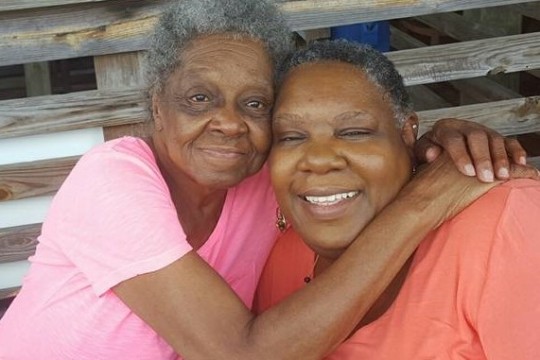
When I helped establish a sewing guild the following year, our members honored her through activities that involved her love of quilting. As a cornerstone of our guild, we choose an organization to give back to as part of our social justice and service focus. For 2020, we created a “Forget Me Not” quilt that was designed by Jenny Doan of the Missouri Star Quilt Company in honor of her late mother-in-law who succumbed to Alzheimer’s. The purple flower template was inspired by the Promise Garden flowers featured in the annual Walk to End Alzheimer’s®, which my mother’s grandchildren have participated in several times.

The quilt was created at our Annual Retreat in June 2020, and once completed we partnered with Crimson Tate Quilt Shop to advertise an online raffle benefiting the Alzheimer’s Association. Through a posting on Instagram, I was approached by Jennifer Lovell Buddenbaum, manager of The Longest Day for the Alzheimer’s Association Greater Indiana Chapter, about fundraising through that program. This partnership will garner more exposure for the raffle, thus bringing in more funds for the organization that has taken up the mantle to help eradicate this debilitating disease. I recommend those that can to partner with the Greater Indiana Chapter to participate in “The Longest Day.” The creative parameters in which you can participate are only as limited as your group’s imagination. The personalized activities serve to further honor the life’s work and impact of the people that we love. If you need guidance, Buddenbaum will offer suggestions to help you get started and maximize your fundraising.

Over the years, I shared my journey with my Momma and the impact that dementia and Alzheimer’s had on our lives. Below are several Facebook postings that I shared with family and friends about our journey. One of the last posts was a little less than a year before she died. I cried writing them. I cried again today re-reading them. I miss my Momma. All of her. The part of her that celebrated me in that irrational way that mommas do about their children. I miss her creativity and her sassiness and her decisiveness. I miss her hugs and her kisses and her dancing. But in all that is lost, what is left is my opportunity to honor her; to lift up her example of struggle and triumph so that others can find the same in their situations. In that way she’s still right here. Until we meet again.

Facebook Posts:
May 12, 2018
Love Letter to my Momma: Each day I try to give my Momma a thousand kisses. Each day I try to sing, "I'll Always Love My Momma" to her. I have worked through years of anger, frustration, pain and hurt about her dementia. I am now at acceptance. My Momma is NOT her dementia. Each day I look for her smile and her "NOWness." I enjoy who she is NOW. I enjoy fighting with Vickie Powell over her affection for us. I enjoy telling her to stop giving all of my kisses to Alnita Lee. I enjoy seeing Kingston knock her over because he wants to be near her. Or Butter and Biskit at her feet waiting for her to drop them some food. I enjoy laughing at how Vanita Powell can't get her to do anything! LOL I enjoy her "Everydayness." I don't take for granted that so many in my circle of family and friends don't have their Momma. I will not live one day of regret later because I didn't spend the time with her now. She is my heartbeat. I love everything about her. Unconditionally. And I know she loves me back. She tells me a thousand times a day. Happy Mother's Day, Momma!
December 3, 2016
This is going to be long. But it's for me anyway....
So my mother has dementia. This means that she is not the same person she was before. She is different. Quite a bit different. We are both different because of it. I think her dementia scares a lot of people. I think it scares a lot of people who love her. She doesn't remember everything and everybody. Hell she doesn't remember my name on a daily basis. She calls me "Momma." Sometimes she calls me "brother." Yesterday she kept calling me "Lee." But most days she says in the most "matter of fact way" I have ever heard, "I love you, Tony." She says it so matter of fact that it quickens my spirit. It's so true. It's so real. When she says it, all of the fear--most of the fear-- that she won't remember me one day goes away. I rest in that truth.
Her grandson William Duncan talks to her 2-3 times a week. She says about the same thing. "When will I see you again?" She doesn't always remember exactly what his name is. Sometimes she calls him "Jim-bo!" I don't know who that is. And Man just laughs. Other times she tells him, "I know who you are." And she knows exactly who he is. And they laugh together, and she asks, "When are you coming to see me again?"
Dementia doesn't follow a "way it is" kinda plan. As soon as she's written off as "Oh! poor thing she has dementia" she astounds us all. The other week my sista-friend Donna and I were reminiscing about family and life. Momma says something like, "Yeah, but we've had really good lives." Donna and I look at each other and celebrate the moment.
When my brother James and my sister-in-law were getting on the road we asked Momma to pray. She was known for her really loooong drawn-out prayers! She didn't pray immediately. We held our breath. Maybe she didn't exactly understand how to do it anymore. As soon as I decided that I would lead the prayer, she began, "Dear Heavenly Father I thank you for my family...." We shouted! Momma was still "there."
Many don't call her. I have come to believe that it is out of fear. Vickie Powell calls literally everyday. They talk an average of 1.5 minutes. I'm sure that she's afraid, too. But she calls.
Hell, I'm afraid. I see her slipping away. As a matter of fact, "she" has already left the building. If anyone is looking for "that" Linda Lee that used to reside at 3602 Emerson in Indianapolis, IN, she has left the building. But...
The Linda Lee that is kind and loving and funny and witty...yes, even witty (in a really racy sort of way) is still here. She's here. And you're missing out on HER. I am happy that the dementia is kinda acting as a cushion for her. She doesn't lament over who isn't calling her and checking in with her. She doesn't know. I know. And I feel bad that you're missing out.
This thing called dementia has changed my life. In a weird, twisted, odd way I am a better person for it. I once described having to care for her as a "good hard." It is what it is and so much more. Momma has dementia, but she's so much more than just an old woman with dementia. So very much more.
September 24, 2016
So now my Momma is calling me "Momma" almost 100% of the time. Of course my rational mind knows that her dementia is the genesis of this. But my emotional mind is fighting and I keep demanding that she call me Tony. I am fearful that the day she can no longer do that will be the day that I "lose my momma." #grieving
April 13, 2014
Most of you who know and love me know that my Momma has dementia. I have learned so much from this experience. I was at first angry and lost because she is not the mother who raised me. However, I am not exactly the daughter she raised either. I have learned to accept the Tony that has grown to be me based on all of my education, travels, encounters, and experiences. So I have learned to love my "new" Momma. She has taught me patience and "nowness." When she asks me where she's going to sleep tonight, I no longer flinch; I answer her question. When she says "good morning" to me 100 times a day, I say "good morning" back. We go to the movies. She doesn't remember what she has seen five minutes after we leave the theater. Hell, half the time neither do I! She is an expert cook who hasn't boiled an egg in two years. I thank her for cooking me a complete meal: meat, veggies, bread, AND dessert--every day of my life I lived with her before going off to college and years beyond that. I've changed my perspective of things. Just a paradigm shift that continues to give me "peace beyond my understanding." So today's word is "perspective." Some say the cup is half full....my cup runneth over.
0 notes
Text
Short story: Battle of Bosworth, August 22, 1485
I fought for Richard technically, and somewhat begrudgingly. I was a Yorkist by misfortune of geography, and for lack of other options. All the men from my village felt the same way: Richard, however corrupt he was, had a better claim than Henry, and it was our duty to fight for the rightful king. In our hearts, we fought for Edward, Richard’s nephew and rightful heir, even though it was surely Richard who had sent him to the Tower.
I suppose I fought for Edward’s memory more than anything, which might seem a strange thing to fight for, but it’s no more strange than fighting for land or religion or honour. All war is strange.
Weeks prior, I spoke my will, which was duly recorded. Five pounds: a modest sum, but enough for Joan to find a good man when I was gone. We had no children, but I told the scribe that I was ‘willing to die as a child of the Church’. There would be no church on the day of battle; only flesh and fear.
Every day before that day, I worked in the field. It was honest work. It gave me physical strength, and a knowledge of the land. But I had no skill as a soldier, only the experience of fighting in drunken brawls. Nevertheless, I needed to prepare as best as I could.
Being a peasant, I couldn’t afford armour, only something I could fashion for myself: layers of thick fibre cloth wrapped tightly to my body, but not so tight as to restrict my movement. Besides that, I had a pitchfork and my own wits. I could have carried a sword, but I decided on a weapon with range, to preserve distance with the enemy. People mocked my choice, to leave so much to Joan and to spend nothing at the blacksmith’s. It might have been the best decision I ever made.
I had no training in the art of war, like the rest of the farm-folk and laymen who joined me on the hill. The only training I had was what I could conjure in my imagination. I practiced thrusting the weapon in the weeks before the battle - late at night - so my wife would not be reminded of what awaited me in the field. Under summer stars, I heaved the fork deep into hay-bales, imagining the groans of dying men and the spilling of guts. I withdrew the pitchfork each time to find it covered with grass, not blood.
During the long evenings of June and July, I walked many miles with the weapon to build my endurance. I carried it in twenty different ways, to get used to the feel and weight of it. It was not heavy, but after hours of carrying it, it would become cumbersome and tiring. I ran with it sometimes to test my body’s limit, and learned to still my breath when I ran out of it. I knew nothing of battle, but I knew that fear would run me ragged if I did not know how to control it.
———————————————————————————————
Thick clouds swirled over the field, hot and loud, the August sun sweating behind them. We mustered atop a hill, a mile or so south of Market Bosworth. The Yorkist leaders told us we had a good defensive position. There were thousands of us and more were joining. Men jostled with each other to stand at the back of the crowd, far away from the downhill slope that lay between us and Henry’s men. Maybe it was pathetic but I did the same. I didn’t want to die first, and if I could help it, I didn’t want to die at all. All of the commonfolk gathered that day had such hard, disappointing lives but we so desperately wanted to live.
I had never seen a cannon before, and yet here, us Yorkists had several. Archers took up their positions, and knights on horses. This increased my confidence. Henry’s forces, way over on the horizon, appeared to have none of these luxuries. We must have outnumbered them by three to one. Even for someone so unversed in battle as myself, victory seemed certain, though I had no convictions about my own fate.
A soldier carries in him the stupid hope that he is worth saving, and though I believed in God, I knew he would look out for me no more than any other man on that field.
Horns blared, and the arrow of time moved irrevocably towards destruction. The battle had begun. There was a magnificent strain in my body. I had never been more fearful in my entire life, and never felt so alive.
I wouldn’t dare utter a word of it to my comrades, but I knew that I would not go to meet the battle. There were braver and stupider men than me who would do that. If my hand was forced, then I would have no choice but to try and survive, and I would need to let something greater than men decide if I was worthy of another day.
I glanced at the Yorkist faces around me, and it turned out that there were few men, far fewer than I expected. Even among the eldest, I saw boyish faces, children merely posing as men, petrified and thinking of their mothers. I have no doubt my face looked the same to them too.
Pockets of laughter jolted me out of fear, and God knows, I needed it.
We held our position on the hill, and watched as Henry’s forces crept over the horizon. Their numbers seemed to grow as they approached. Our archers loosed arrows from the crest of the hill. Each barrage brought a handful of bodies down. I cheered with the other men, even though I should have been ashamed. Men were a pointless statistic at that kind of range.
Soon I heard war-cries from the far side of the hill. We responded by sending our own notes of fear down there. There could have been seconds or minutes separating the two sides. I was too far back to see. I felt the pressure of bodies around me as we squeezed tight, preparing for some sort of impact force. My body had been braced all morning, but it found a new level of tension. Piss ran down my trembling legs.
And that’s when the battle came to me. We were blindsided. I hadn’t realised at the time, but these were Stanley’s forces, who supported Henry from the flank. Lord Stanley, first Earl of Derby, was supposed to be helping us! What little us commoners knew.
We were overwhelmed. Yorkists fled in all directions, and either met Henry’s cavalry riding towards them, or Stanley’s hidden men, charging from the sides. A tidal wave of desperate bodies came over the hill, lunging metal into any place where it might stick. It moved so fast that I could no longer distinguish between sides. Once I found a little space, a jabbed towards anything that came close. I couldn’t even stave off the first wave of attack.
I was struck down by a footsoldier. He could easily have been one of us, but it was irrelevant. He dodged a jab of my fork and slashed a line across my gut. My innards threatened to fall out there and then, but I somehow managed to tilt my body backwards on to the mud. In the shock of it all, I didn’t manage to scream. I felt a distant pain, which was superseded by the desire to vomit.
I closed my eyes and curled into a ball. I was sweating; a great sickness had taken over me. The ground shook with the thunderous steps of thousands of men. I passed out, and woke up again when the fury of battle had moved elsewhere.
How pitiful it was, my shortlived career in combat. And of course it wasn’t just me, but me was all I could think about as I writhed in the mud, beginning death. The waste of it all caught me by surprise.
I don’t know why the footsoldier didn’t finish me off there and then. Perhaps he knew he’d done enough, and found another farmhand to slaughter. I was so bitter and resentful. I knew I wasn’t truly prepared to kill anyone that day, and I thought that the injustice of it gave me some sort of moral high ground. It was little comfort with my spleen ripped open.
Later, amid my groans of pain and seemingly interminable death, I shouted ‘Coward!’ and ‘Disgrace!’ to the man who had struck me, though he was likely long gone, probably in a free house somewhere enjoying a celebratory pint of ale.
I laughed at the absurdity of war, and death, and all the hopelessness of that day. And I laughed at the absurd beauty of the last vestiges of life. Men taking their final breaths, making their final prayers, kissing tokens that reminded them of home, for home was where they were going.
I wept with pity for those who would survive. They would live on in suffering, in the knowledge that they had done dark deeds. Perhaps they would be relieved to live for another day, but they would never erase from their mind what they had seen, heard and felt. Then I turned my pity inward, for I would never see my wife’s face again. Joan - sweet, blessed Joan - the thought of never seeing her again was more painful than any physical wound. My body convulsed as it brought forth tears. I screamed like a birthing mother, knowing only pain. I lost myself.
When I calmed, I thought of Joan and our lost child. Was it my fault? Had I not been enough of a man to give her what was her natural right? War, I hoped, would be a chance to correct my failures as a man. If I showed courage, and found a way to survive, maybe I would one day give her a child.
Joan loved me - I knew that - but I knew how she saw me, as a man ready to accept life, rather than going out to meet it. She told me I was enough for her, but I couldn’t trust it. Perhaps the problem was that I wasn’t enough for myself. I realised that the reason why I had been standing on the hill with a pitchfork that morning was not political, it was philosophical. I wanted to show I had what it took be a man. What a delusion it was. I felt everything but man now.
I hoped I would be dead before the day was done, but the night held me in her arms instead. She was kind to me. The skies cleared, and though the mud was cold, the air was warm. Taking my last breaths, I gazed at the pregnant moon, wondering if there might be anything beyond it, anything greater. I was raised to believe that heaven lay up there, but it didn’t really matter to me now. There was only wonder.
0 notes
Text
The Fables of Æsop
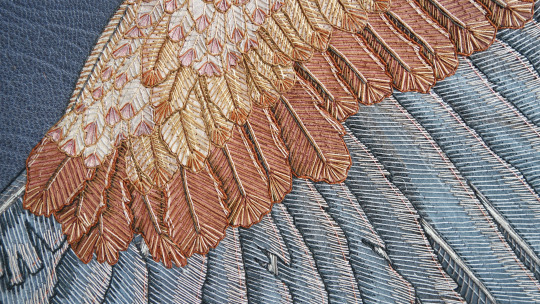
This blog post is about a binding that was actually actually completed in September of last year for the 3rd International Designer Bookbinders Competition. Given the anonymous nature of the competition I have waited until now to do a write up about it and have also held back on posting up anything on social media between now and the announcement of the prizes (although it was very tempting to do so!).
In December of last year I was thrilled to find out I was one of the 28 prizewinning binders. There were 194 entries from 31 countries and 74 bindings in total were selected to make up the “Heroic Works” travelling exhibition. The private view and prize giving took place on Monday 17th July when I learnt I was one of the twenty-five “Disinguished Winners”, earning myself a wonderful little Doric column award with my name engraved onto the top.

Andrea Odametey of Germany took first prize with her beautiful paper binding of "Daedelus and Icarus". The strips of paper are fixed crossways in two planes and are ordered like the feathers of wings.

Second prize went to Rachel Ward-Sale of the UK with her wonderful binding of "The Homeric Hymn to Aphrodite". The design of her binding was inspired by broken Greek pottery and the Japanese technique kintsugi, where precious metals are applied to repair and enhance it. Andrea Odametey's binding has been given to the Bodleian Library and Rachel Ward-Sale's to the Getty Collection at Wormsley.

The bindings are currently on display in the spacious Blackwell Hall on the ground floor of The Weston Library, part of the Bodleian Libraries at the University of Oxford. It opened to the public in March 2015 following a three-year transformation, the refurbishment turned the 1930′s Grade II listed building into both a world class research library and a new visitor space with exhibition galleries, a lecture theatre, a cafe and shop.
The theme of the competition was, “Myths, Heroes and Legends”, a wide and open field from which to choose a text. I searched online for a text block that would fit the brief and settled upon a 1909 Hodder and Stoughton publication of “The Fables of Æsop”, with wonderful illustrations by Edward J. Detmold.

I have a particular penchant for nature, especially birds, so this book felt like a natural choice for me given the number of bird and animal related fables. Given the three dimensional nature of a book, and therefore the different possibilities for decoration, it gave me scope to select a variety of the fables and illustrate each separately on different parts of the binding.
It so happened that at the time of working on this binding I was living in Queens Park in London and at the annual “Queens Park Day” there was an Eagle and Vulture display team, Eagle Heights, there doing a show - we came within centimetres of some of the most awe-inspiring birds of prey in the world! What better place to do a bit of feather-related research...
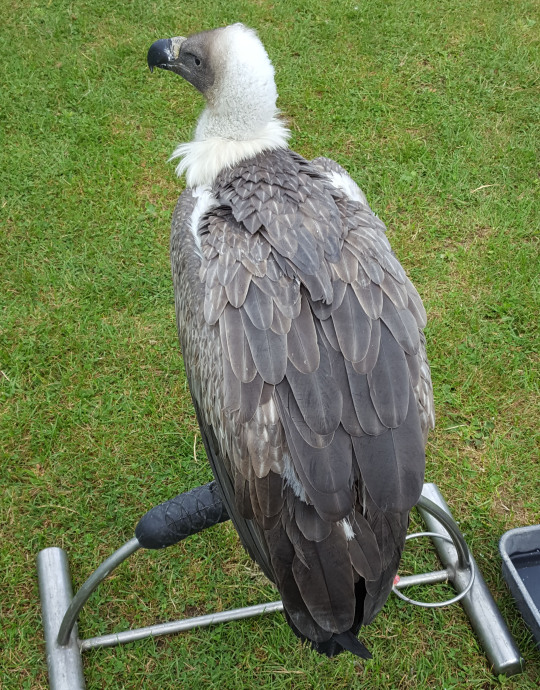
The first task was to chose the fables I wanted to illustrate and where they were all going to be placed, listed as follows:
________________________________________________________________
‘THE OAK AND THE REEDS’ – The box
A very large Oak was uprooted by the wind, and thrown across a stream. It fell among some Reeds, which it thus addressed: 'I wonder how you, who are so light and weak, are not entirely crushed by these strong winds.' They replied, 'You fight and contend with the wind, and consequently you are destroyed; while we on the contrary bend before the least breath of air, and therefore remain unbroken, and escape.' - Stoop to conquer.
‘THE EAGLE AND THE ARROW’ – Front cover
An Eagle sat on a lofty rock, watching the movements of a Hare, whom he sought to make his prey. An archer who saw him from a place of concealment, took an accurate aim, and wounded him mortally. The Eagle gave one look at the arrow that had entered his heart, and saw in that single glance that its feathers had been furnished by himself. 'It is a double grief to me,' he exclaimed, 'that I should perish by an arrow feathered from my own wings.' - A consciousness of misfortunes arising from a man's own misconduct aggravates their bitterness.
‘THE HEN AND THE GOLDEN EGGS’ - The 3D hen atop of the front book edge and the front doublure
A Cottager and his wife had a Hen, which laid every day a golden egg. They supposed that it must contain a great lump of gold in its inside, and killed it in order that they might get it, when to their surprise they found that the Hen differed in no respect from their other hens. The foolish pair, thus hoping to become rich all at once, deprived themselves of the gain of which they were day by day assured.
‘THE FISHERMAN AND THE LITTLE FISH’ - The edge decoration and the front and back endpapers
A Fisherman who lived on the produce of his nets, one day caught a single small fish as the result of his day's labour. The fish, panting convulsively, thus entreated for his life: 'Oh Sir, what good can I be to you, and how little am I worth? I am not yet come to my full size. Pray spare my life, and put me back into the sea. I shall soon become a large fish, fit for the tables of the rich; and then you can catch me again, and make a handsome profit of me.' The Fisherman replied, 'I should indeed be a very simple fellow, if, for the chance of a greater uncertain profit, I were to forego my present certain gain.'
‘THE SWALLOW AND THE CROW’ - The 3D crow and swallow atop of the back book edge and the back doublure
The Swallow and the Crow had a contention about their plumage. The crow put and end to the dispute by saying: 'Your feathers are all very well in the spring, but mine protect me against the winter.' - Fine weather friends are not worth much.
‘THE ANT AND THE DOVE’ - The back cover
An Ant went to the bank of a river to quench its thirst, and, being carried away by the rush of the stream, was on the point of being drowned. A Dove, sitting on a tree overhanging the water, plucked a leaf, and let it fall into the stream close to her. The Ant, climbing on to it, floated in safety to the bank. Shortly afterwards a birdcatcher came and stood under the tree, and laid his lime-twigs for the Dove, which sat in the branches. The Ant, perceiving his design, stung him in the foot. He suddenly threw down the twigs, and thereupon made the Dove take wing. - The grateful heart will always find opportunities to show its gratitude.
________________________________________________________________
Once I had worked out the design I set about pulling the book. The original text block contained numerous illustrations from drawings by Edward J. Detmold plus 23 original tipped-in colour plates.

Unfortunately the plates had been tipped onto a paper that had quite badly deteriorated over time through fading, and the edges had had a lot of wear. I therefore decided to carefully remove the images from these pages, pressed each of them flat, and sourced a new paper on which to re-mount them.

The best match I could find colour and weight-wise was 312 Dark Green Hahnemuhle Bugra Butten paper from John Purcell Paper. As I knew I wanted to decorate the edges of the text block, rather than tipping in the colour plates before re-binding, instead I tipped in waste sheets to compensate for their thickness. I also made sure the waste sheets were the same size as the book‘s pages so that they would span right to the edges of the text block in order to have a level edge to aid me when doing the edge decoration. These were to be removed at the end and replaced with the colour plates.
In the process of pulling the book I realised it was going to be necessary to repair the spine folds of the sections where the original sewing holes had been as they were quite large and vulnerable. I did this using Japanese tissue (dyed to the same shade as the paper of the pages) and paste.

I chose to use the endpapers to illustrate the fable of “The Fisherman and the Little Fish” and wanted to print a net onto them. I inked up the net using some black lithographic ink and a roller, then laid it onto paper and pressed it hard in the nipping press.
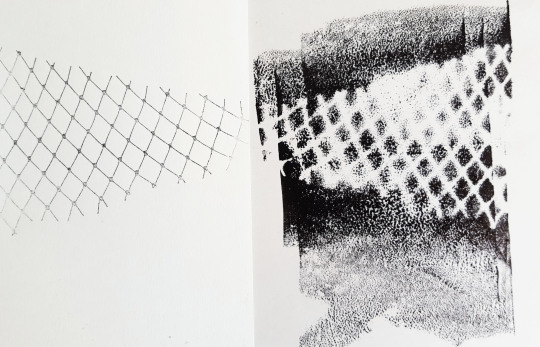
In order to get the net printed in exactly the correct place on the page so that it could run around the book edge continuously from the front to the back I had to carefully map out where to print it. I made a paper frame upon which I could stick the netting to in order to print it in the right place on the page.

Once inked up, the page was laid within the frame and the whole thing was pressed in a nipping press.

The printed pages were left to dry for a few days and were then made up into the endpapers. Before laminating these with a folded sheet I cut out a small fish and backed it with gold leaf, to illustrate “The Little Fish” in the fable. The sections were then individually pressed before being sewn onto 4 tapes using a link stitch.

The book was squared up and placed between boards under a weight and the spine edge was glued with PVA.

Once dry, the shoulders were marked onto the outer edge of the text block and placed between backing boards. The spine was rounded and backed before being glued up and lined with linen between the tapes.

I was then able to sand the three edges flat in preparation for the edge decoration. Firstly I clamped the book tight in a press and made up a template for the top edge which I tacked in place with a couple of small pieces of masking tape.

Through small holes I had pierced out of the template I was able to pencil in the joins of the net. I then removed the template and inked in the net using a fine nibbed pen.
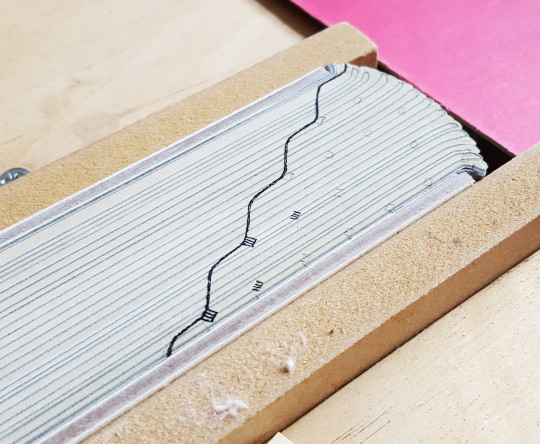

Given it was hard to accurately print the net on the front and back endpapers exactly in the correct place it was necessary to slightly elongate the netting across the spine to match. I started by drawing guide lines in with pencil and worked out the spacing manually. I then inked in the lines.

The end result was quite satisfying...

For the headbands I worked with black and cream thread, working them in a pattern to continue the grid of the net on the top edge.
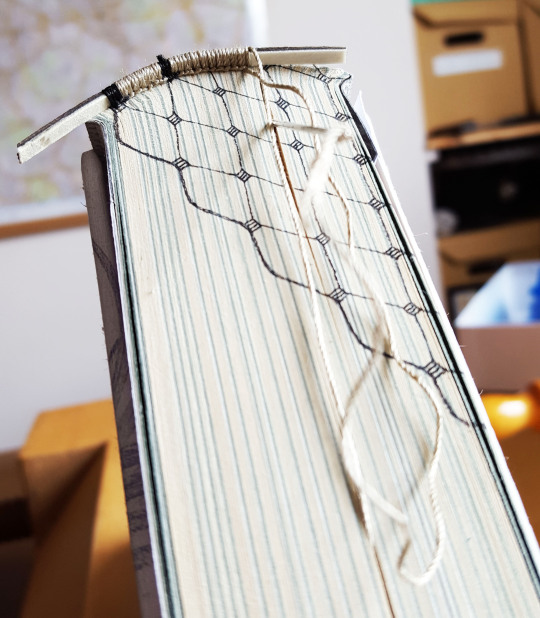
Before lacing on the boards It was necessary for me to fix three metal tubes into the board edges. These were in order to insert some three dimensional characters into the board edges - a part of the overall final design. Firstly I cut some channels into the core of the board using a jeweller’s piercing saw.

I then encapsulated some square profile metal rod into the channels by laminating watercolour paper each side.

A hole was drilled down the centre of the square rod in order to fit a 1mm gauge pin which would later be topped with some carved figures. The edge of the board was then sanded to a bevel all the way around.
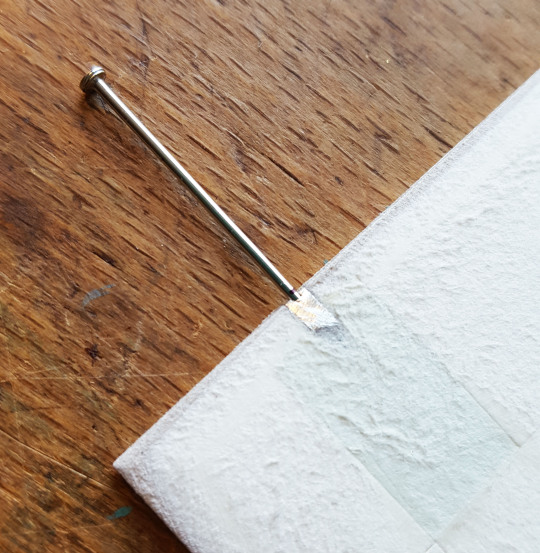
The boards were then laced on and back-cornered.

It was then time to work on the leather, starting with the onlays. The leather I used for the onlays was the split/suede side of a variety of coloured skins that I coloured with watered-down white acrylic paint. This gave me the colour and texture I wanted for what was to become the feathers of the two wings on the cover design.

These onlays were then stuck down in place on the covering leather with PVA through a tracing paper template, first the dove’s wing on the back...

...then the eagle wing on the front, starting with the larger bottom feathers...
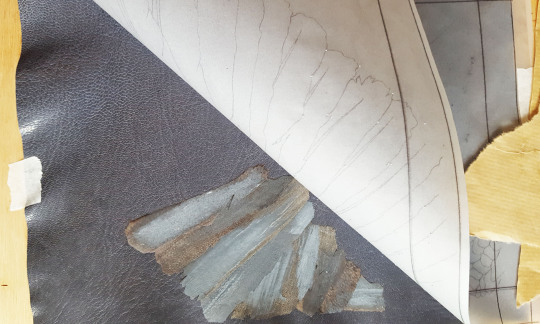
...building up to the smaller feathers on the top of the wing in a lighter colour.

Once these were done I was able to back-pare the leather and begin the embroidery process. Firstly I worked on the outlines of each of the individual feathers, pricking the holes first using a needle bodkin. I then used a Holbein stitch that was further whipped around with a thread of the same colour.

I used a different thread colour for each of the layers.
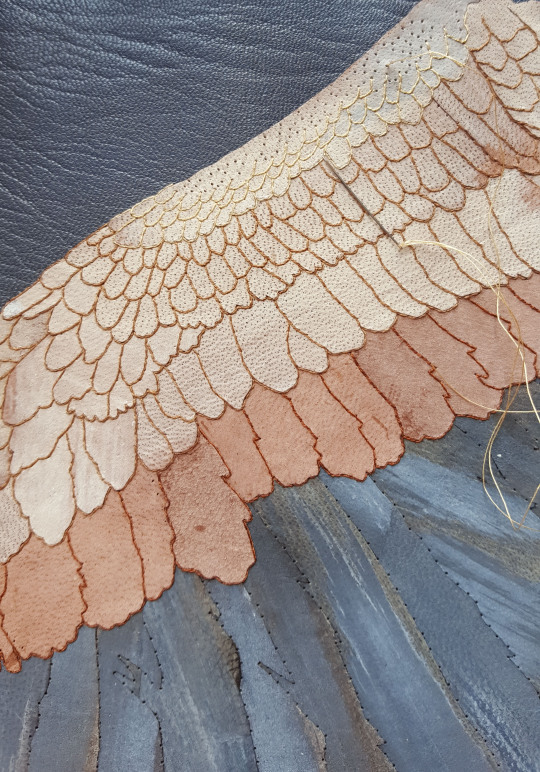
I then added the central quill shaft of each feather before adding the linear vanes to each using a couching stitch to tie down the long threads.
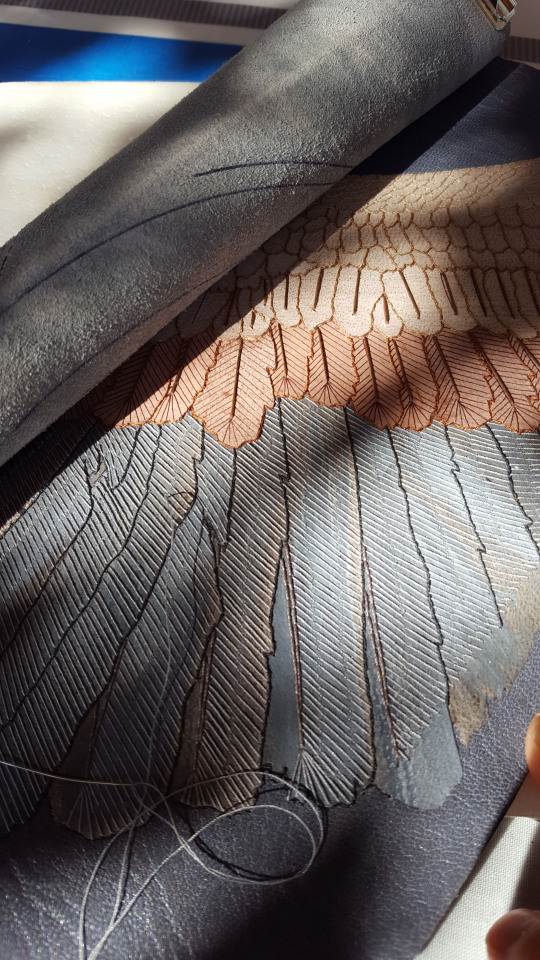
Next I added shorter threads to add a tonal effect on each of the feathers.
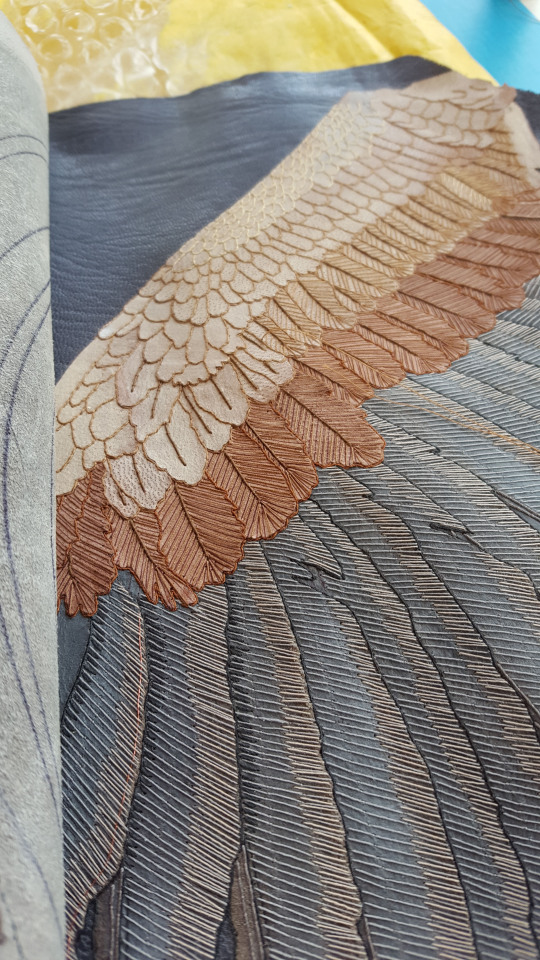
And added further stitches to each of the quill shafts in contrasting coloured threads.
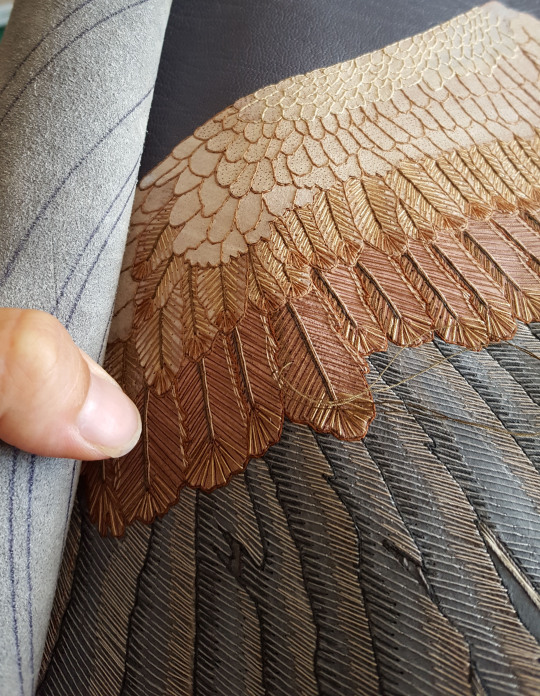
The reverse of the leather began to take on a life of it’s own too!

The topmost feathers then got the same treatment.

Finally, metallic threads were also woven in underneath the stitches of the vanes, copper in colour for the largest great feathers...

The same method was used for the wing of the dove on the reverse using threads in white, light greys, gold and silver.
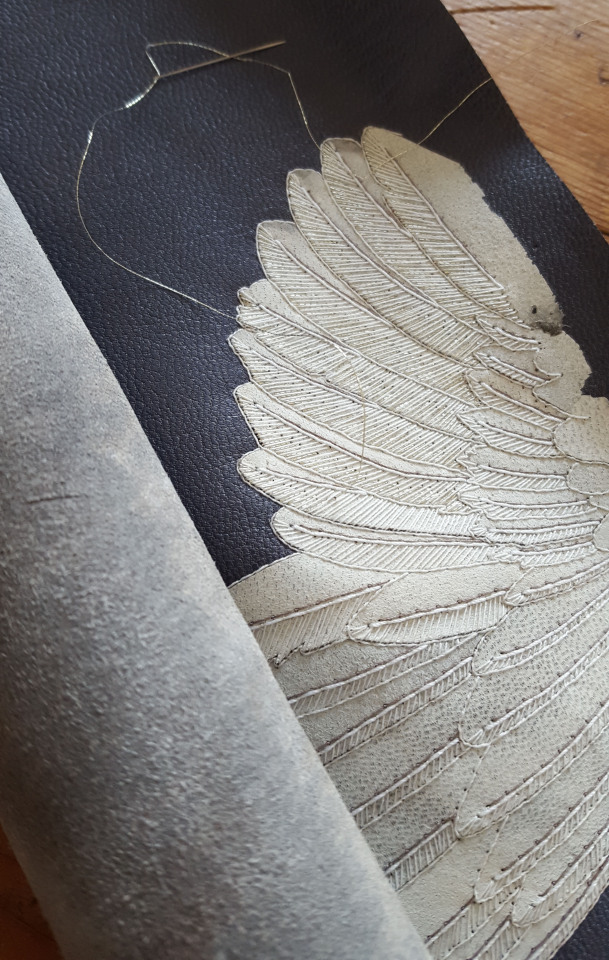
The water ripples on the back cover of the book were first machine sewn using a sewing machine and then they were whipped by hand in a thread of the same colour.
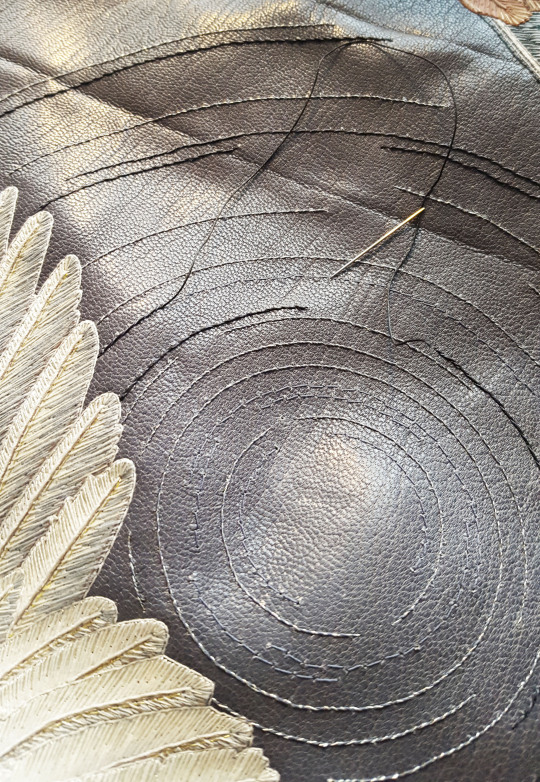
Finally a “floating” leaf made from gold leaf adhered to Japanese paper was stuck down in the centre of the circular ripples.
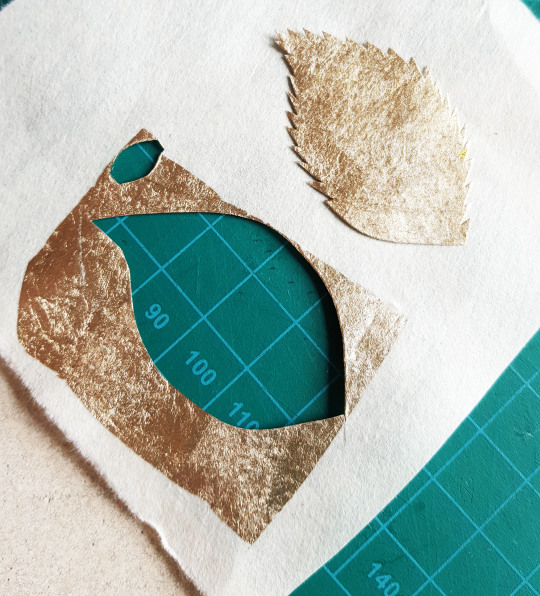
The body of a black ant was inlaid onto the leaf and the legs sewn on top of it, along with some veins on the leaf.

Once the embroidery was complete the leather was damped on the front with an atomiser and then paste applied to the back.

Despite all of the embroidery the leather stayed pretty flat and went down onto the book easily - always a relief!
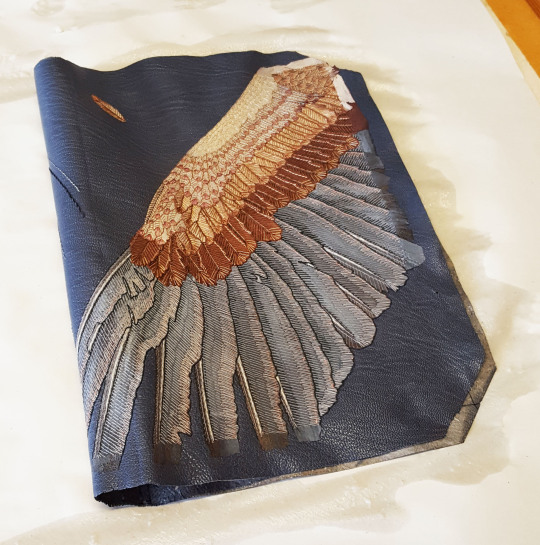
A couple of days later, once the paste had dried, it was possible to open up the book boards by dampening the outer joint with water. I could then stick down the leather joints and infill the insides of the boards.

The front and back endpapers were devised to work with the little three dimensional characters I had designed to sit on the board edges. The same gold leaf on Japanese paper (as used of the leaf on the back cover of the book) was used here. On the back endpaper featured some swallow feathers for “The Swallow and The Crow” fable...
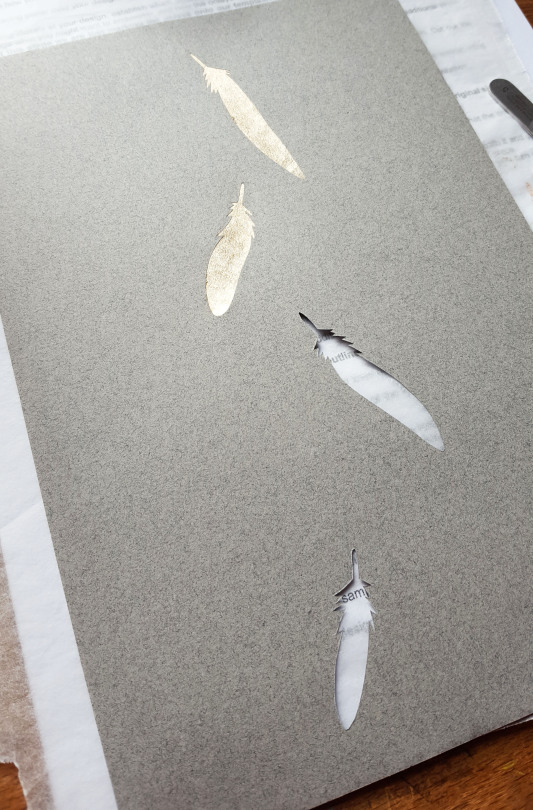
...and on the front some golden eggs for the fable of “The Hen and The Golden Eggs”.
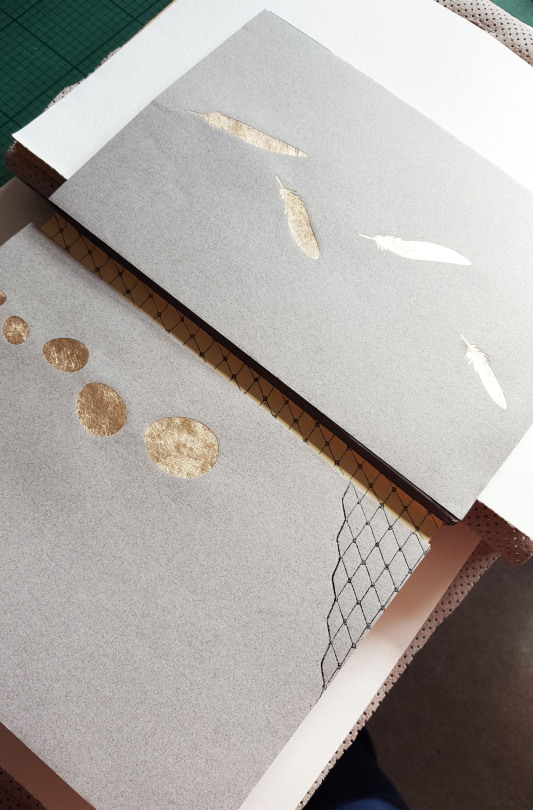
I don’t often title my books but decided on this occasion I would like to title both the book and the chosen fables featured on it. In order to tie each of them into the design I tooled individual letters onto punched circles, firstly onto paper.

These were then adhered in place on the endpapers and doublures of the binding using PVA glue and tweezers to place them down correctly.
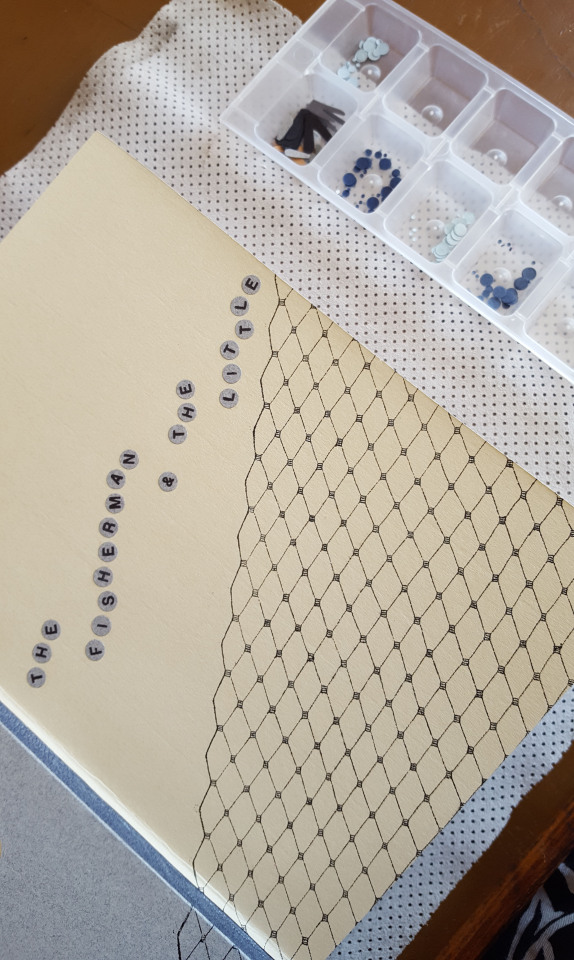
I added extra circular “bubbles” in a variety of blues to illustrate the watery sea that the fishing net was in.
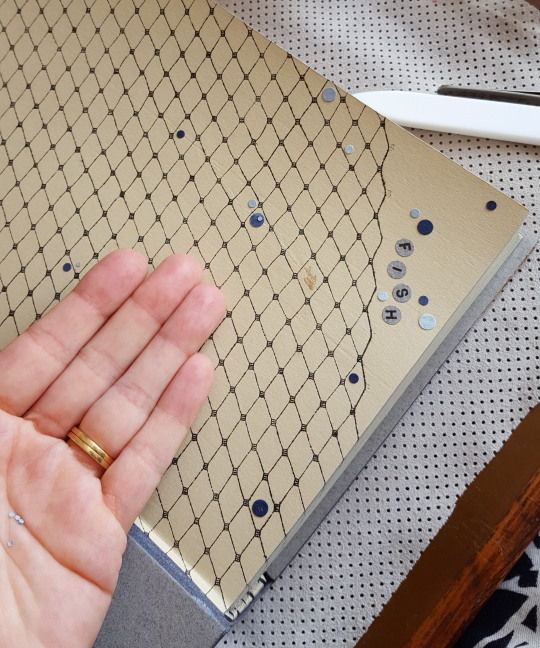
I then did the same for the cover, tooling the titles onto leather circles.

For “The Eagle and the Arrow” fable, before gluing the title down the circles were placed in position in order to work out the tooling of the arrow heads.
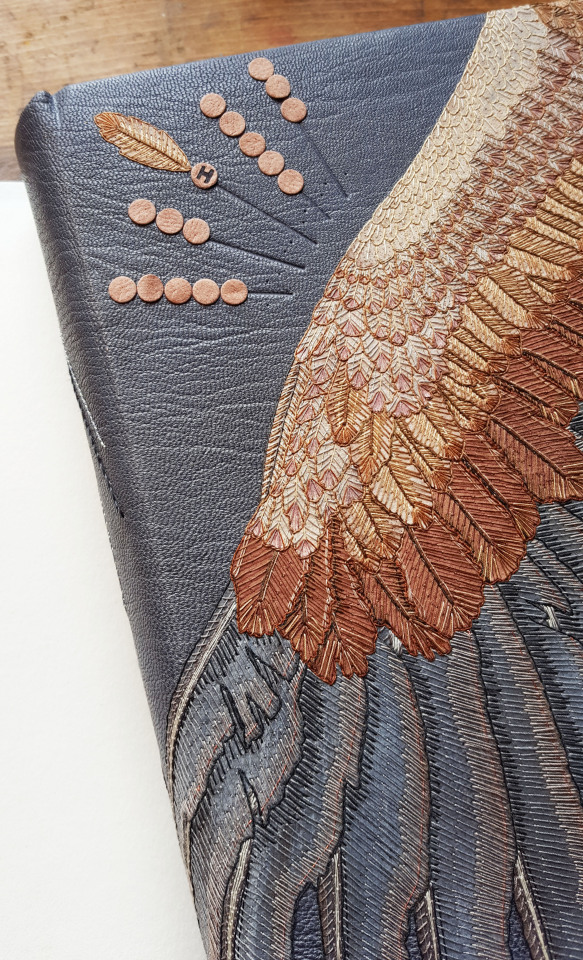
The gold tooling of the arrow heads could then be done using Moon gold.

And finally the title of the book was tooled in Moon gold leaf using larger handle letters, on larger circles of leather. These were stuck down on the spine section of the binding, following the curved lines of the water ripples.
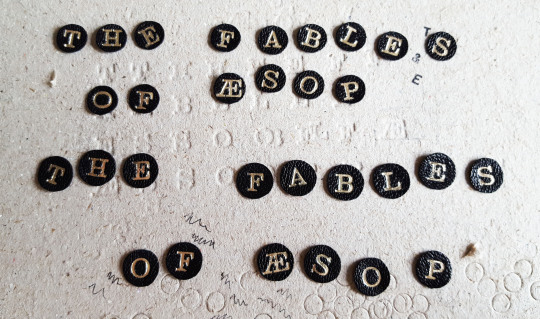
From the onset of working on this binding I knew I wanted to do something to take it to the next level - it was for a competition after all! I decided the way to do this would be to make some small three-dimensional pieces to sit on the boards of the book, but to be removable so as not to be impractical. I decided to carve some birds to illustrate two of the fables that I had chosen to feature on the doublures.
I worked out how large the three birds in question (a hen, swallow and crow) needed to be in scale to one another. I then used some little blocks of tulip wood that were first roughly cut to shape with a junior hacksaw.

These were then shaped using files and sandpaper until I was happy with the end result.

Pins were glued into a drilled hole to make the legs. One was left long as this would be the pin that was going to push into the metal tube inserted into the boards. The other was left short enough so that when the wire legs were formed the foot would sit on the top edge of the board to stop it from spinning.
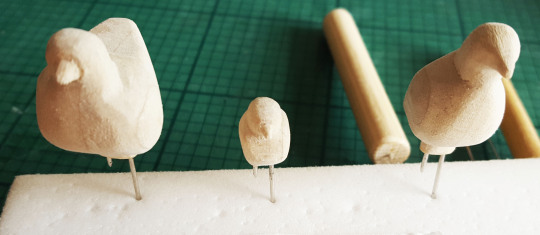
Paper feathers were cut for each of the birds in the relevant colours, including some feathers cut out of the Japanese paper/gold leaf lamination.
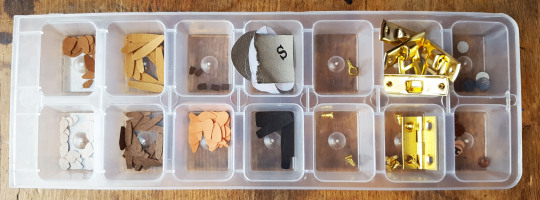
The wooden forms were then painted with acrylics ahead of the feathers being stuck to them using PVA. The feet were formed using wire and a spot of glue added to the base of the feet to keep them in place.
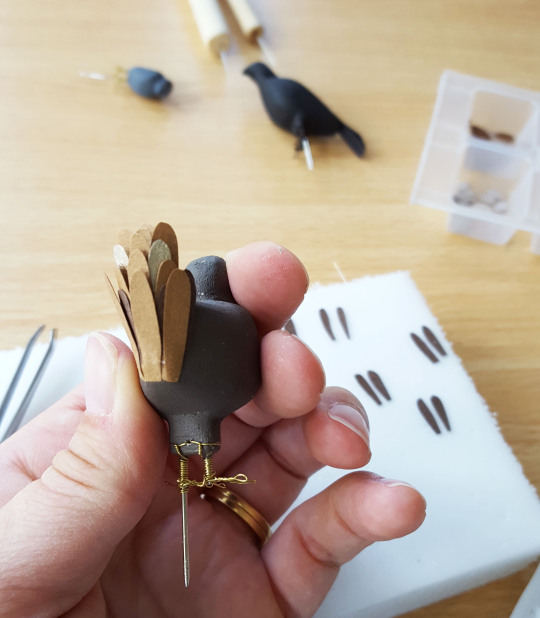
Once all of the feathers were added the beaks were painted and little eyes added.
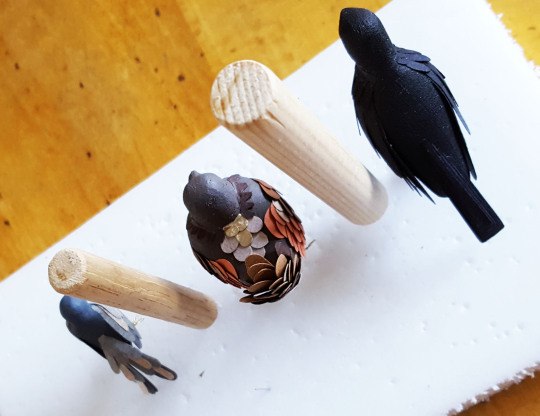
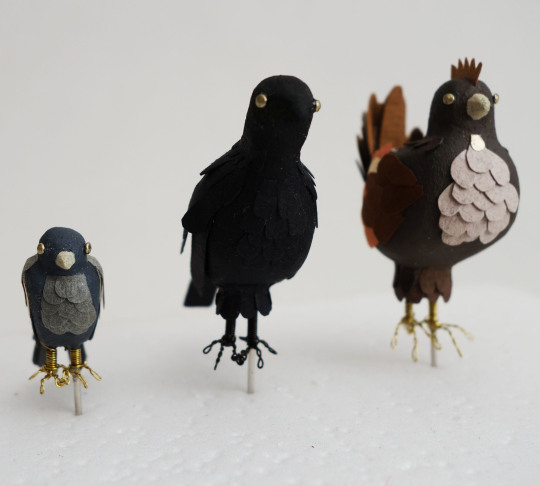
With the addition of the three dimensional birds I needed to make a container that would house them in safely both for storage and for travel, given the books were due to tour as part of the exhibition. I devised a box that had an extra section above where the book was going to sit for the birds to sit in. A piece of wood was machined to slide in and out of the top section upon which the birds were to sit on “perches”.

The box sides were machined from oak with a channel routed into them in which to hold the Diabond lid and base of the box. The Diabond panels were covered in paper to match the look of the endpapers and doublures. A ratchet strap was used to hold the box tight whilst the glue dried and then small brass pins were driven in to hold the corners secure.
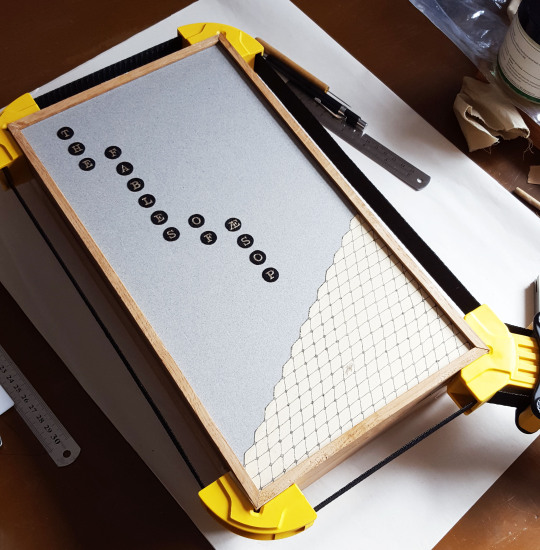
The box was lined with paper and oak spacers added to hold the book snugly in place. A ribbon was attached to aid the lifting of the book out of the box.
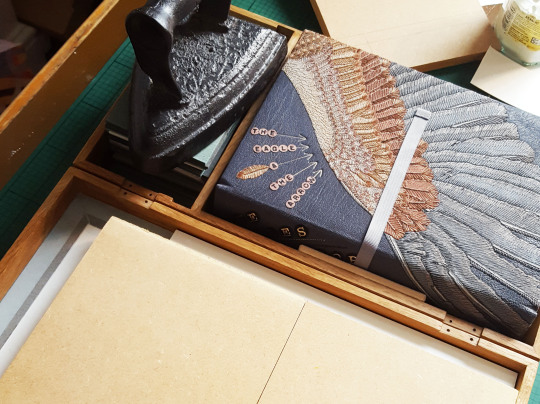
Finally the spacers that were stuck in at the beginning of the binding process were removed and the original colour plates adhered back in place.

A removable foam cut-out was included in the box to stop the birds from jumping off their perches during travel!
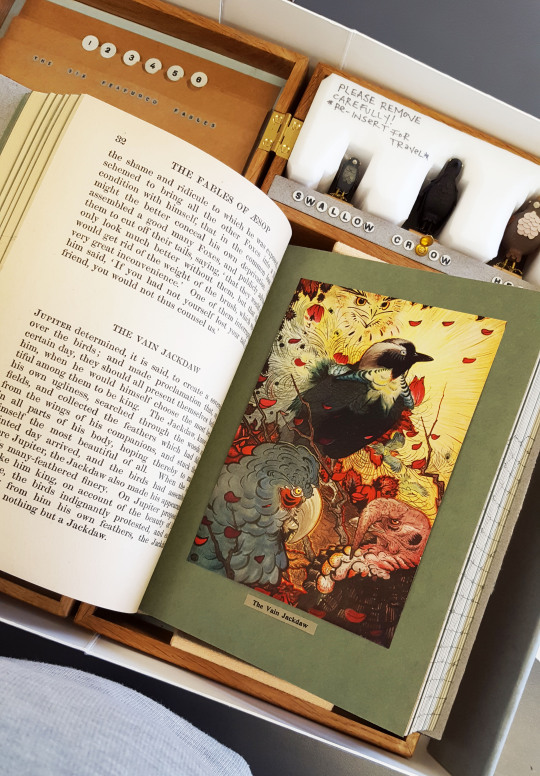
The book was delivered to Oxford and then the waiting commenced...!
I am now pleased to share the details of this binding and have now posted it onto my website at the following link:
The Fables of Æsop
I will leave you some photos of the final binding...

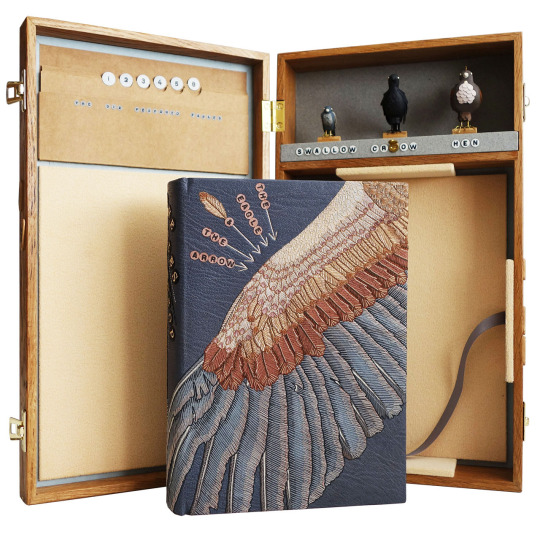
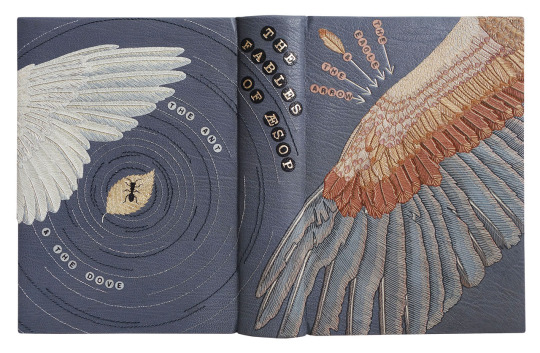




#myths and legends#heroes#bookbinding#embroidery#birds#feathers#the fables of aesop#aesopsfables#bodleian libraries#designer bookbinders#aesops fables#commission#bird#wings#printing#gold#gold tooling#oxford#net#fisherman#eagle#swallow#hen#oak#wooden box#craft#handmade#inspiredbynature#craftsposure#createmakeshare
479 notes
·
View notes
Text
Italy to Greenbush: Living the American Dream

The Rane family’s American Dream started a few generations before the Yella Fella. As a matter of fact, it began when the Rane family was the Reina family migrating from Italy.
It’s hard to imagine the challenges that immigrants faced when they decided to come to America. For many, it meant leaving family behind, facing tremendous hardships and losing touch with their loved ones for what could be years. There are countless stories of families that took on these hardships to seek better opportunities in America, living frugally and sending their wages back home in the hopes that someday, their family would join them in America.

The story of the Reina family is no different. It begins in the early 1900s in the picturesque town of Cammarata, located near the center of Sicily, Italy. The town was charming and beautiful, but it offered little work for the men who struggled to feed their families, as the village was poor and the people were starving.
This beautiful but sad environment prompted Giuseppe Reina to realize that the world did not end on the island of Sicily. He dreamed of a world beyond the drudgery of the Multi-Coffari salt mine or working the land in the small farms. He yearned for a better life for his family.
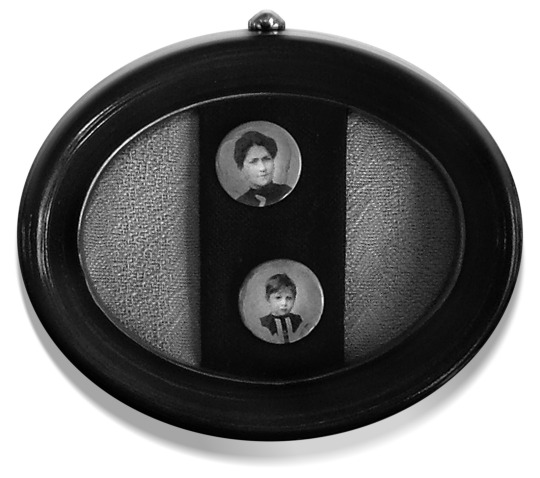
Giuseppe shared his dream with his wife, Concetta, and they decided that he would go to America ahead of them and send money back home. Someday, she would come to join him. He didn’t know it then, but it would become what was known as the "American Dream," and his family’s version of that dream would start in the Greenbush neighborhood of Madison, Wisconsin.
In the spring of 1907, Giuseppe boarded the passenger ship Liguria in Naples. He took only what he could carry — a knapsack with clothing, his passport, a ceramic wine jug and two celluloid pins decorated with pictures of his wife and oldest son. He left behind his wife Concetta, his three-year-old son, Sam, and his infant son, James.

It’s a misnomer to call the Liguria a passenger ship. Guiseppe’s passage cost $7.50, but all that included was space for travel and meager meals served in buckets. The passengers in steerage were, in truth, considered just a step above livestock, and they were packed together at the bottom of the ship. But the dream of America was at the other end of this journey, so the suffering was worth the trouble.
As the Liguria passed Ellis Island, the entry point for all immigrants into the United States, Giuseppe’s eyes welled up with tears as he gazed at the Statue of Liberty. Silence fell over the ship as the passengers said a prayer of thanks to God and Lady Liberty as they finally touched the shores of America.
Guiseppe’s life would never be the same.
Finally in America
As Guiseppe entered America, the Immigration Officer could not understand his heavy Italian dialect. In a hurry, the officer translated “Guiseppe Reina” to “Joseph Rane,” and his new life in the new world was born. Joseph made his way to the Greenbush neighborhood of Madison, Wisconsin, where a network of Italian families and immigrants helped each other find work and places to stay.
Joseph’s first job in America was as a laborer. He didn’t live in a rented room. He rented a bed that was shared with other laborers who worked different shifts. He spent nothing on entertainment and frivolous pursuits. Every extra penny he had, he sent home to his wife and family. Finally, in 1912, after five long years of saving, his wife and sons joined him in Greenbush.
At this point, Joseph upgraded from a rented bed to a rented apartment at 638 Milton Street. Their first son, John, was born there in 1914, and Tony joined the family in 1916. A few years later, Joseph and Concetta were able to purchase their first house at 612 Milton. Mayme and Frank were born there in 1922.
Little Anthony, known as Tony to his family, almost didn’t make it through his first year of life, as he developed pneumonia at 9 months of age. But Tony survived, showing the fighting spirit he inherited from his father that would follow and serve him throughout his life.
“My father earned his living by the sweat of his back,” Tony said. “He built a home, fed us and clothed us. He educated six kids without help or complaint. Never once did he ask for assistance. That’s what makes me so proud to be his son.”
Tony’s formal education ended when he graduated from high school, but he made it a point to continue learning for the rest of his life. While he never attended secondary education, he made it a goal in his life that his children would be educated. He was serious about enforcing that goal, too. Years later, he sent his son Jimmy to Marion Military Institute when his grades weren’t up to par. “Marion made all the difference in the world,” Tony later recalled. “It was the best money we ever spent. Jimmy went on to Auburn, then Cumberland for a law degree, then to Harvard. I honestly believe that if we didn’t send him to military school, none of that would have happened.”
Another pivotal moment in Tony’s life came when, at 15 years of age, he participated in the international competition of the Junior Optimist Club and placed third. He was awarded the book, Three Points of Honor.
It contained “The Optimist Creed” which set the tone for the rest of his life, as well as helping form those qualities in his children.
The Optimist Creed:
Promise yourself..
To be so strong that nothing can disturb your peace of mind.
To talk health, happiness and prosperity to every person you meet.
To make all your friends feel that there is something in them.
To look on the sunny side of everything and make your optimism come true.
To think only of the best, to work only for the best, and to expect only the best.
To be just as enthusiastic about the success of others as you are about your own.
To forget the mistakes of the past and press on to the greater achievements of the future.
To wear a cheerful countenance at all times and give every living creature you meet a smile.
To give so much time to the improvement of yourself that you have no time to criticize others.
To be too large for worry, too noble for anger, too strong for fear, and too happy to permit the presence of trouble.
Like many other Americans, Tony was called to duty in 1941 and on May 1, 1942, he found himself on a train headed to Camp Rucker in Ozark, Alabama. Overnight, he and the other soldiers set up a 1,000-bed hospital and eventually took care of soldiers that returned from overseas. It was there Tony met his future wife, Elizabeth “Libba” Mills. When he was transferred to Rome, Georgia, they decided to get married. He returned on a three-day pass and they were married on September 30, 1943.
When they returned to Battey General Hospital in Rome, they immediately began to care for injured soldiers who had been shipped back home from the combat operations at the Salerno and Anzio beachheads in Italy.
After the war came to an end and they were separated from the service, Tony and Libba decided to plant their roots in Abbeville, Alabama.
He started in the trucking business with his brother-in-law transporting and selling watermelons, but Libba was pregnant with Jimmy and the work was too far from home.
At that time, Libba and Tony were living in one room in the Francis Hotel, a hotel in Abbeville. They came to know the owner, Mrs. Frankie Murphy, who ran the hotel. She was getting to an age where she was no longer interested in running the dining room in the hotel, and she made an offer to Tony. “I will build an addition to the hotel for a restaurant you can run if you put up the money for the equipment.” Tony knew an opportunity when he saw one and agreed. Every bank in town turned him down for a loan, but, out of the clear blue sky, Mr. Edward Phillips – a Shorterville, Alabama, merchant – lent Tony $4,000 to get the restaurant started. Tony asked, “How do you want me to pay you back?” Mr. Phillips answered, “You tell me how you want to pay me back and I’ll hold you to it. Make your own deal. I expect you to live up to it.”
It’s just the way things were done in a small town in the South in those days.
Tony named the restaurant the Village Inn, and it became a favorite stop not only for the locals but for traveling salesmen.
At one point, Tony worked out an agreement with the Army to feed soldiers–both black and white. At the time, the South was not integrated and some people took issue with the idea of blacks mixing with whites. There was talk of boycotting his restaurant, but Tony held his ground. Jimmy recalls the lesson: “You watch your dad do those kinds of things and it will instill courage in you, it will encourage you to go against the odds. I watched him do things like that all the time,” Jimmy proudly recalls. It’s clear those lessons translated to Jimmy and, eventually, to the corporate values and business ethics of Great Southern Wood.
Tony let no grass grow under his feet. After the restaurant, he owned a furniture store and a jewelry store, and he eventually opened another restaurant in Eufaula. His spirit of entrepreneurialism, no doubt, inspired Jimmy, who reluctantly took control of a fencepost treating plant after his father- and mother-in-law died in a car accident. That was the very beginning of Great Southern Wood, but that’s another story.
Pride in his country was at the very core of Mr. Tony’s character. It’s the same loyalty that was instilled in him by Guiseppe and Concetta and that he passed down to his children. Those same values became the corporate values of Great Southern Wood, and they have remained for the past 50 years — values that go beyond selling lumber: Duty. Honor. Country.
Two generations later, that American Dream Giuseppe Reina had is very much a reality for his family. Visit YellaWood.com to see what was made possible by his sacrifice and hard work, laying the foundation for his family to be successful in the land of opportunity.
0 notes
Text
Basics
A lot of debate, in the past year or so, has come down to putting a label on people’s politics. So-and-so is A Liberal; thus-and-thus is A Leftist, or A Socialist. Mostly, this serves as a reason to dismiss somebody, whether or not they’re right — you would say that, you’re a liberal, or well, that’s just purity politics talking. But, as a feminist, it’s also my job to at least try to have solidarity with women who disagree with me. In the process of trying that, I realized I’d really never tried to write down a coherent description of my politics before. I’d called myself a “socialist” until maybe 2015, found myself called a “centrist” from 2015 through 2017, took a bunch of stupid political-compass tests where I always wound up on the same square as Jill Stein and/or anarchists (pretty far left, all the way at the bottom toward the “anti-authoritarian” end, to answer your burning question) and still really had no idea how to communicate where I stood or why I stood there in discussions with other women.
Here, just because I imagine the question will come up again, is an attempt at a description of my politics — economic, identity-wise, role-of-Nazi-punching-wise, what have you. It’s not much, but as women increasingly have more good-faith arguments on the direction of our movements (which is lovely; I would rather do that than hear some man explain Why Identitarianism Is Ruining The Left any day of the week) it might give some grounds for an assessment of what I’m saying and why I’m saying it. I mean, assuming an “assessment” is the point, and not a Twitter fight — my optimism is boundless, I guess.
1) The center point of my political engagement, the thing everything else revolves around, is feminism — ending misogyny and default male power in America. I don’t think it’s inherently superior to any other locus; your activism could center queerness, black lives, economic inequality, and be just as meaningful, if not more so. But I choose feminism, because feminism chose me. By the time I left elementary school, I had seen two instances of near-fatal domestic violence within my immediate family. In one of them, a woman was shot in the spine and left paralyzed for life. I knew about other cases where women’s boyfriends or husbands controlled what they ate, or “accidentally” killed their pets. I knew two girls who had been raped by my sophomore year of high school, and that count only increased once I got to college. And, of course, I experienced my own share of violence. Basically, by the time I was sixteen, I knew I lived in a world that violently hated women — that hated us enough to kill us, and that did kill us more often than anyone wanted to admit. I have spent the rest of my life figuring out what to do about that. It’s what I care about, and I admittedly care about it more than anything else, including my own self-interest at times. You’re free to choose your focus. This is mine.
2) There is no useful feminism without intersectionality. In fact, feminism, arguably more than any other cause, is bound to intersectionality, just because every single group in the world has women in it. This makes it practically impossible to craft a universally true statement about “women,” or to issue a blanket call for “women’s solidarity.” Women will probably always have opposing interests, or disagreements, and (as long as we live in an oppressive society) some women will always be able to oppress or exploit other women. I’m pretty obviously a flawed vehicle for intersectional feminism, given that I’m white, and straight, and cisgender. So I try to stay educated about the interests and experiences of other women, to reflect on those in anything I write as best I can, and to keep those women in mind before assuming my own experience is universal. I try to fight for the interests of all marginalized groups — or at least to support fighters, where I’m not qualified to speak up myself — because all of that is essential to supporting women as a whole.
2a) One place where you might disagree with me: I do believe that even extremely privileged women experience misogyny. Misogyny is a structural factor that impacts women because they are women, and for no other reason; I also believe that misogyny alone can ruin or kill a woman, even if she has everything going for her. So I don’t necessarily view even very privileged women as “enemies” — any woman can, potentially, be enlisted to the cause — and I try to frame any criticism in a way that steers clear of misogynist tropes.
2b) Another place for good-faith disagreement: I believe that getting women and other marginalized people into positions of power has real, positive impact on its own. Of course, you have to take into account what those women believe — no-one is saying Sarah Palin or Ivanka Trump are feminist sheroes — but if a woman is reasonably progressive, she represents a concrete improvement over the white man who currently occupies that position. There are different value levels to this: Getting women into government is far more important than getting women into corporations. But giving women higher-paying jobs matters, too. Sexism, like everything else, is economic; the reason women face economic discrimination is the same reason that over 90% of all abusive relationships involve financial abuse, which is that patriarchy wants to instill dependence in women. Patriarchy wants to make it impossible for a woman to survive without a man’s patronage and approval, and thereby render those women passive, submissive, and (this is important) unable to resist violence or walk away, because they cannot survive outside of the relationship. Ideally, all women would have equal access to resources. In the meantime, women should be supported in building bases of economic power within the world we have.
3) And, speaking of economics: I believe that American socialism is the goal, but that it’s not exactly a short-term goal. Which is to say: Everything I’ve read suggests that structural and identity-based oppressions are in fact improved under socialism, because the marginalized have that base of economic power from which to resist their oppressors. And, in America, class is deeply tied to identity; poverty is reliably caused by bigotry, and fighting poverty therefore fights bigotry. Yet I’m skeptical about getting there quickly, and don’t think any of us should live as if “the revolution” is going to happen tomorrow, or in five years, or in ten. The nation that elected Reagan in a landslide within my lifetime, the nation that made George W. Bush a two-term President, the nation that recently elected Donald Trump, does not seem like a nation that’s going to turn into Scandinavia (or even Canada) before I turn 40. I think we are more likely to get there via a gradual leftward culture shift, and pragmatic policies aimed at increasing the social safety net in specific ways (like the FAMILY Act or Obamacare) than we are through one huge victory or grand deluge that changes everything.
4) And, speaking of the deluge: I would prefer my activism to remain as non-violent as possible for as long as possible. Yes, I know the state is violent — more violent than any black bloc or riot could be — and I know that intolerable conditions inevitably generate violence. Still, my activism has its roots in resisting violence, and in witnessing violence, so I can’t romanticize physical force easily. I think violence tends to generate chaos and harm as many innocent people as it helps, and I can’t participate gladly in hurting or killing people.
4a) I do, however, make a distinction between violence and self-defense. Edward Crawford is not “being violent” in this picture — he is throwing a weapon that was intended to harm him back to his attackers, sparing himself from their violence. A woman who speaks up about being raped, harassed or abused is not “being violent” if that man loses his job or goes to jail, nor is she “being violent” if, in a one-on-one confrontation, she fires a warning shot into the ceiling; she needs to get the abuser or harasser away from her, to stop him, and if he will not respond to requests, she will have to use force. Taking Milo’s check mark or book deal away is not an act of aggression. Nobody reasonable has a problem with Nazi-punching. I believe that the oppressed must sometimes use force to limit or contain the oppressor’s violence, basically. Where that fits into the greater picture of limiting or containing state violence, or of “revolution,” I don’t know, except that I don’t want to shoot people.
5) Because those most impacted by economic oppression are women, people of color, and other marginalized folks, any leftist movement should be led by women, people of color, and other marginalized folks. In many cases, like Black Lives Matter (which is largely led by women, including queer women) this is already the case. But if I look at a group of “leftists,” I should see mostly women — or, at least, 51% of the attendees should be women. The reasons for this are practical, not ideological. For example, I recently saw a leftist say they supported the “Norwegian model” for abortion. Norway limits abortion at thirteen weeks. This is before any substantive genetic testing to ensure the viability of the fetus can be done (even the most expensive cell-free fetal DNA testing, which is normally done at around ten weeks, would take a while to return results) let alone before the 20-week test when many fetal abnormalities are first detected. It’s eight weeks earlier than Donald Trump’s proposed 20-week limit, which is already barbaric. Norwegian women & trans people can theoretically get an abortion at up to 22 weeks (still only two more weeks than a ban endorsed by Donald Trump, for fucksakes) but they need the government’s permission, and doctors are allowed to flat-out refuse at any point in the pregnancy for reasons of “conscience” — not exactly “pro-choice.” This is a socialist paradise, and their abortion laws are worse than America’s. There are other instances of this, like the racism of the New Deal, which have been rehashed endlessly. In short: The reason for leadership by oppressed people is that, if your socialism or leftism doesn’t specifically take their concerns into account, it will end up specifically leaving them out.
6) There are also a lot of old-school, probably “liberal” values I hold dear: I think people have a god-given right to disagree with each other, or with The Movement. I ultimately believe in democracy, no matter how frustrating it gets. I believe that it must always be safe to note that the Emperor has no clothes — and it doesn’t matter who this week’s Emperor is, or how “progressive” he claims to be. Hate speech and abusive speech needs to be checked, but “unity” isn’t a positive goal if it means you’re not allowed to make your own choices or say what you think.
7) But she voted for Hillary Clinton! Yes, I did. I grade a candidate on gender politics first (see Item #1) and didn’t much like those of her opponents. I also just like her, as a woman, for reasons I’ve gone on about before. But Hillary Clinton lost four months ago, and won’t run again, so she’s really not the most important part of my work to anyone except people who hate Hillary Clinton. More generally, I believe that voting for mainstream, left-of-center candidates in a general election is not incompatible with further-left activism. I think the two are interdependent. You vote for the candidate who has a chance of winning (which means taking into account all Democrats, not just your own stripe or social group), who will preserve gains rather than rolling them back, and who will be at least somewhat responsive to leftward pressure. Then you apply the pressure through protesting, marching, striking, and creating media and culture change. Some people understandably harbor anger toward those politicians (my husband is intense about Obama and drone strikes, for example) but I mostly don’t — they work in a system designed to limit them, and it’s our job to alter that system. Electing Clinton, or Obama, or whoever, isn’t the end goal of progressive politics. It’s the beginning, setting an acceptable battlefield in the ongoing work of activism — which belongs, not to our elected officials, but to us, and which will not end within our lifetimes.
Well, those are the basics. I imagine there are a thousand points I’ve left unaddressed. But this is the core of what I believe, so that we can argue about that, rather than someone else’s fevered imagination about what I believe, the next time we talk.
99 notes
·
View notes
Text
December 15th, 2016~ Rogue One: A Star Wars Story(2016) by Gareth Edwards
As anyone considerably close to me will regrettably tell you, I am a superbly massive Star Wars fan. Now, in all honesty, the internet is certainly filled to the brim with Star Wars fans, but in my own personal life, I am the biggest Star Wars fan I know by far. Ever since I saw Star Wars : Episode IV-A New Hope (1977) at the ripe young age of eight years old, I immediately fell in love with the magic of a galaxy far far away. Not only did I fall in love with everything Star Wars, I fell in love with the art of cinema. I didn't understand film, or its processes at the time; hell I barely liked movies, so when I saw the first Star Wars, the experience was transformative for me. I was transfixed. How did they freaking do it? It all seemed completely impossible to make something so obviously unreal seem vividly realistic, and lived in.
Fast forward now to 2015. Since the time I watched my first Star Wars film, I've seen all of the films in the franchise, read countless of extended universe (now Legends) novels, as well as the new canon novels, enjoyed their new run of comics, and been a fan of both the Star War Rebels, and Star Wars: The Clone Wars animated series. Since watching A New Hope when I was a young boy, I fell in love with every inch of lore contained within the Star Wars universe. This love launched my love for film as a whole, and to this day that sentiment inspires my imagination. In all truth I watch Episode IV at least ten times a year, and unfortunately thats a conservative number. It only gets better from here.
Then, at the end of that year, Star Wars: Episode VII-The Force Awakens (2015) came out, and boy did it ever increase my love for what George Lucas created all those years ago. By design, the feelings I felt when I watched Star Wars for the first time were reproduced. Now no film is perfect, but damn did J. J Abrams and company knock it out of the park. They did the unexpected with Episode VII. It naturally expanded the lore, and furthered the SW conversation, yet non Star Wars fans could ease on in, enjoy, and feel a part of the universe. It was a great FILM.
Come along on another fast forward if you will; this time to the end of 2016. This time around we have been blessed with Rogue One: A Star Wars Story (2016). Disney and Lucasfilm are in the beginning stages of executing their master plan of producing a SW film once a year. These films include solo, stand alone films unrelated to the storytelling begun inside of The Force Awakens (2015); films outside of the Skywalker storyline.
There was beauty to be had inside of the plan to release a SW film a year. Especially with Rogue One (2016) being the first film out of the gate. The story of Rogue One (2016) is something that every Star Wars fan has been waiting to be explored. How did Princess Leia, and the rebellion get their hands on the Death Star plans? In the old EU (Extended Universe) it was explained, but when Disney purchased Lucasfilm, all of that went down the drain, leaving a vast window of storytelling opportunities.
Gareth Edwards helmed the lukewarm Godzilla (2014) which earned him the job on this film. Godzilla (2014), like Rogue One, is far from a bad film. I think its safe for me to say however, that I like TFA(2015) more than I do this film, due to the story they chose to tell, along with the way they told it. From my point of view, Rogue One is both helped, and hurt by it being so directly linked to Episode IV. Never has there been a SW film so dependent upon the viewing of previous content, and I believe in the long run it hurts the film from being a great FILM as opposed to just a great Star Wars film. The film lacks universal appeal. The SW films of old could be picked up, and watched by anyone, as either standalone masterpieces, or continued sagas. Episode IV was certainly made like this, and an argument could be made in both directions for Star Wars: Episode V- The Empire Strikes Back (1981) and Star Wars: Episode VI- Return of the Jedi (1984)
Upon seeing the film for the first time I was all aboard. It was beautiful to be in the world again, living Star Wars moment after Star Wars moment. I even went as far as telling my friends that I loved the film once I immediately left the theater. Hailing it a top three SW film for me. It was upon reflection in my room alone, however, where I realized I only loved it so much because it gave me the Star Wars I needed. The question had to be asked: Star Wars aside, is it as good of a movie as I thought? Its hard to separate our fandom from the quality of the product, so I went to see it again to be sure, and it was what I thought. I don't like it as much as I thought I did.
The problem with the film isn't that its poorly made or anything of the sort. The film is amazing to witness on the screen, I mean, come on its Star Wars, the boundaries of visual technology must be pushed. The problem is simply that if we strip the film of its Star Warsness, we're left with the unfortunate way Gareth Edwards enjoys telling his stories. Similar to Godzilla (2014) the characters are thin, with little depth for the audience to be lost inside of. Yes, the Death Star gets top billing in the film, but again, that is something that would not fly if any other film was being discussed. That aspect left me empty, not feeling anything for the characters throughout. Gareth replaces Godzilla with the Death Star and Darth Vader, two seemingly unstoppable forces in Star Wars lore.
The third act is enough for me to buy another ticket, and the thing on blu-ray when it comes out though. The last thirty minutes could quite possibly go down as the greatest Star Wars fan film of all time. I just couldn't get behind the vehicle that brings us to that point which is Felicity Jones' portrayal of Jyn Urso. Either Jones simply didn't commit, or Gareth Edwards didn't give her anything to commit to. She glided through her dialogue, not reacting to the things her counterparts did, or said. She accepted them in more ways than one. With a character that has seen, and been through all that she has; you would think that the trauma would bleed through in her performance a little bit more, but it doesn't. She's just a character playing a part in something bigger than her.
It's not as if Felicity Jones isn't talented, she is an Academy Award nominated actress, who can bring depth, and pain out of her characters. The magic was just missing here.
The film definitely has its positives. It without a doubt brought the war that was promised. Gareth Edwards illustrated the grey areas present within times of conflict which causes the audience to think if there is a line that those fighting for the greater good have to be wary of crossing. There will always be heroes, and villains on both sides of a war, which I think was highlighted exceedingly well in this film.
With all that being said, its safe to say that I like this film. The love I have for it is not on the same scale as The Force Awakens, but thats a high bar to reach as far as any new Star Wars films are concerned.
Until next time, family. Peace and Love.
1 note
·
View note